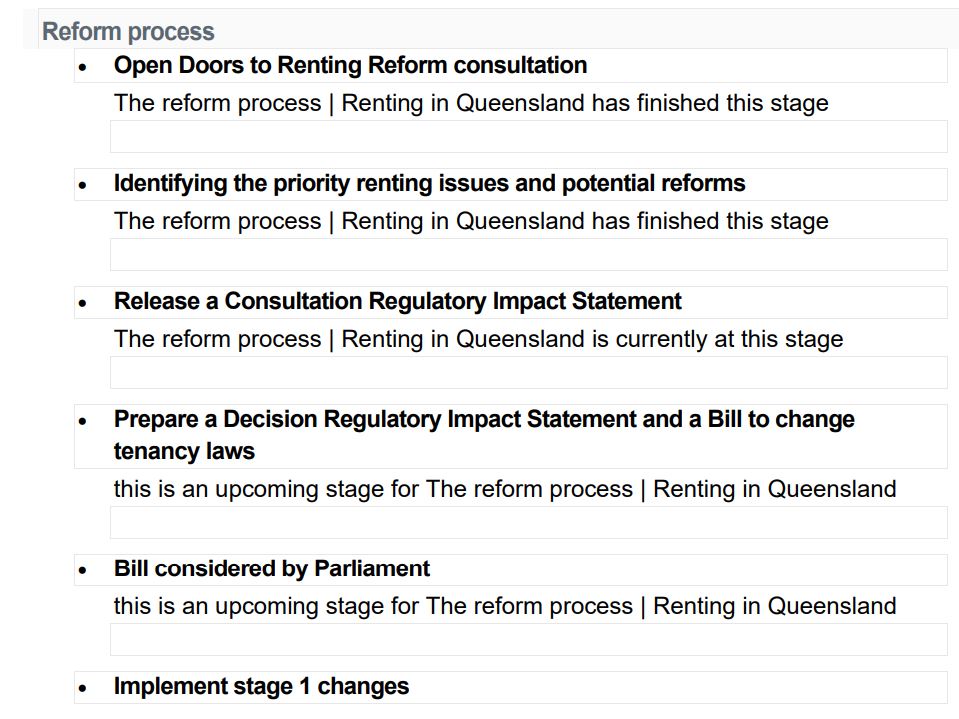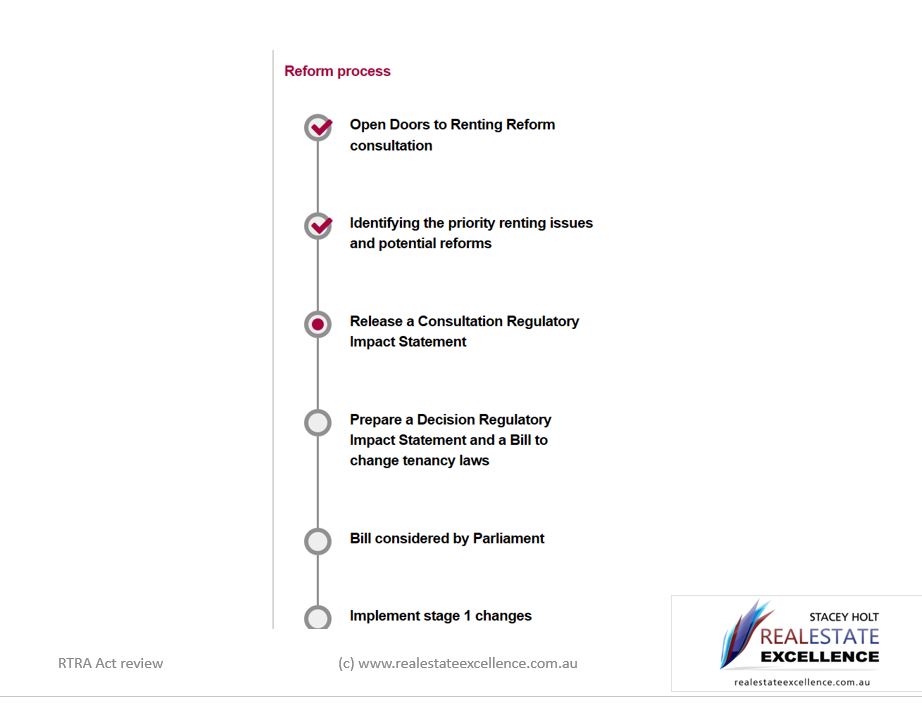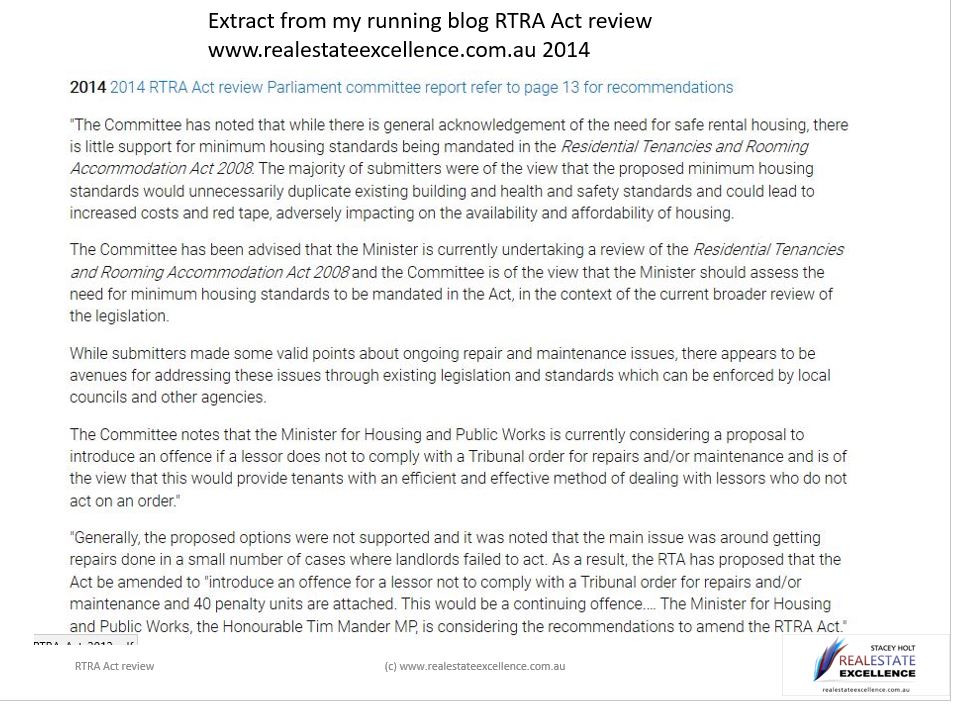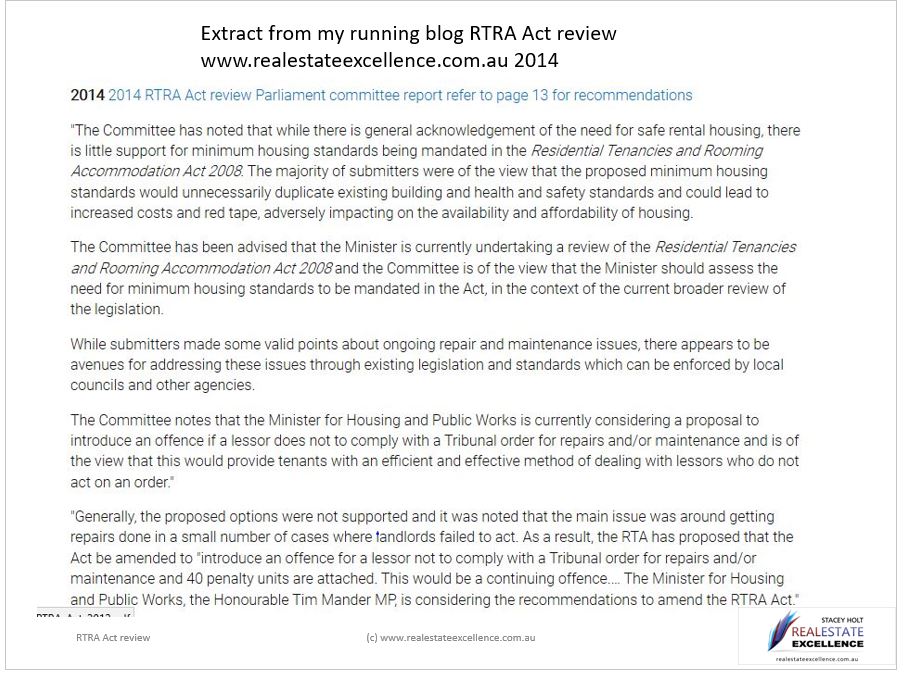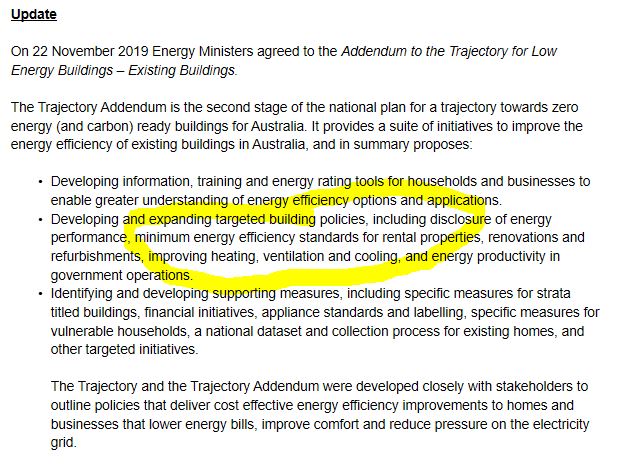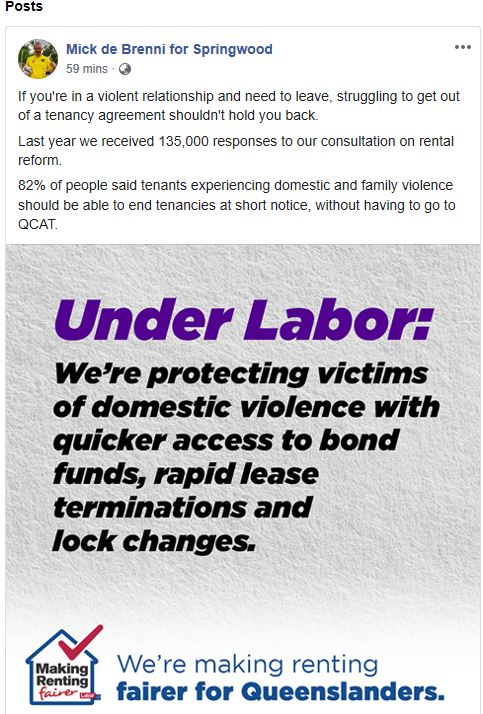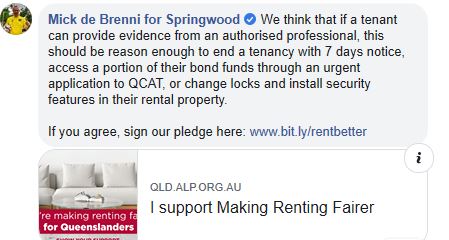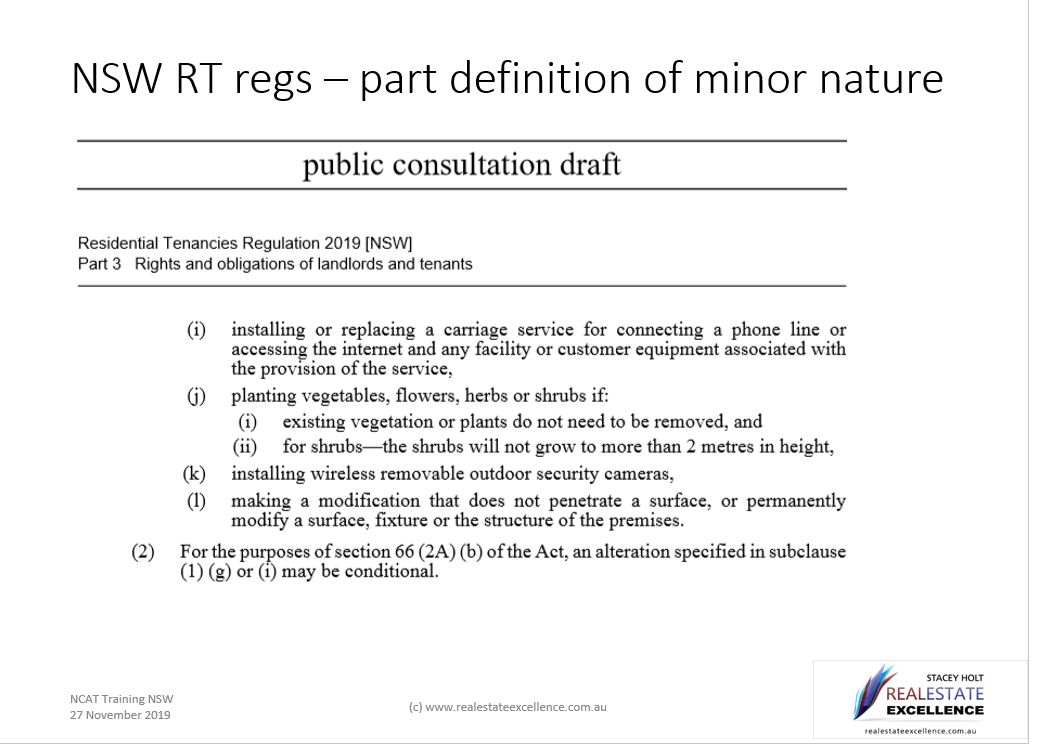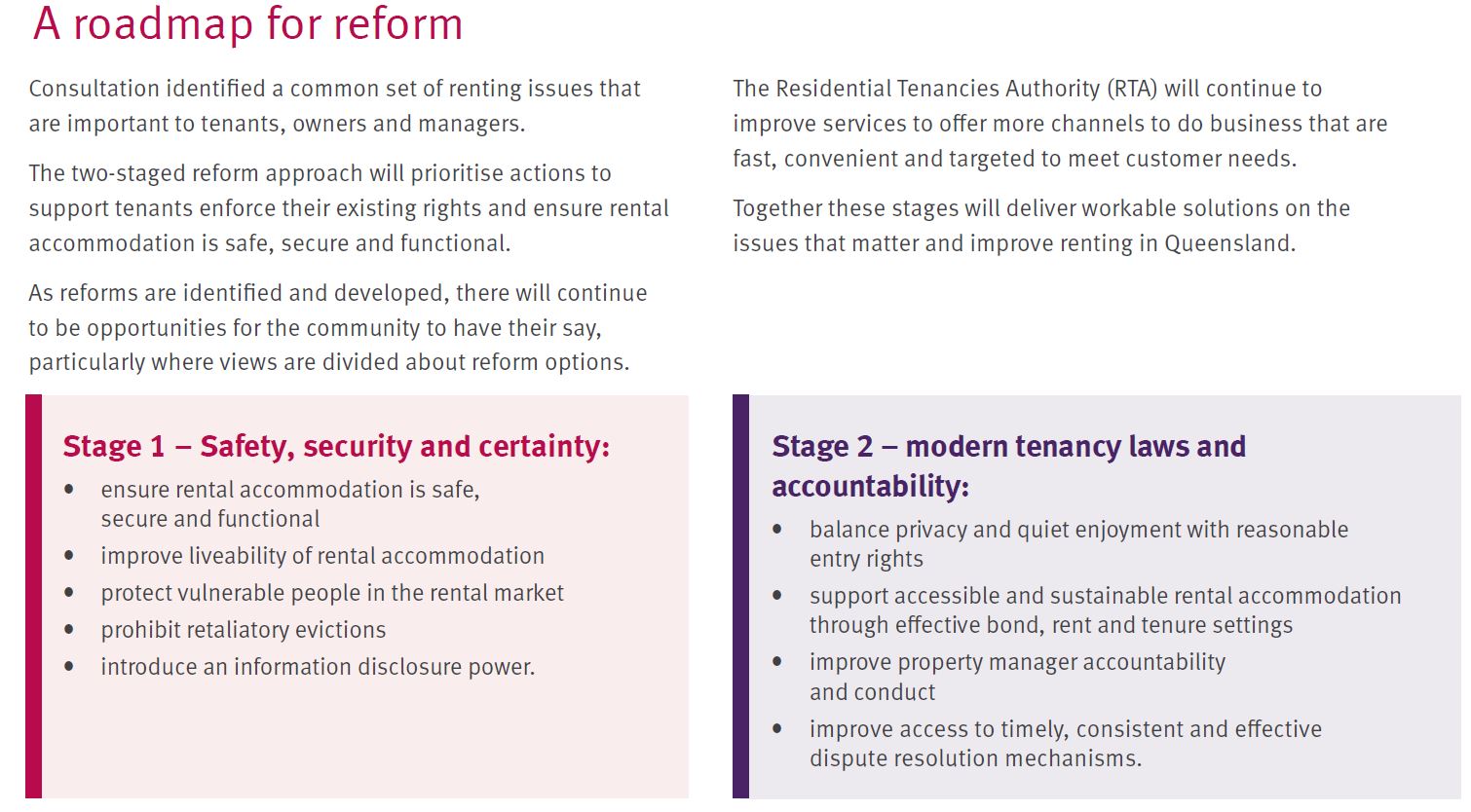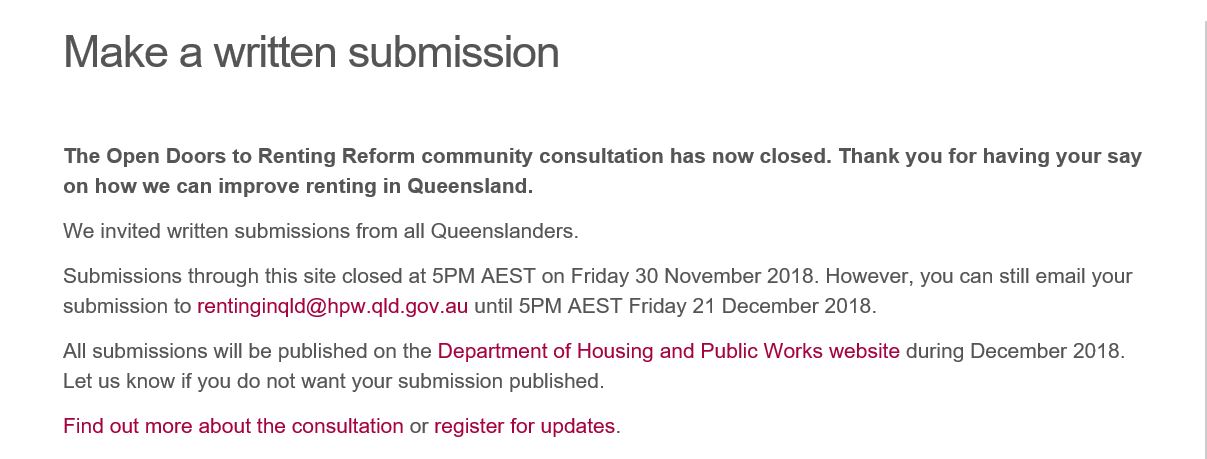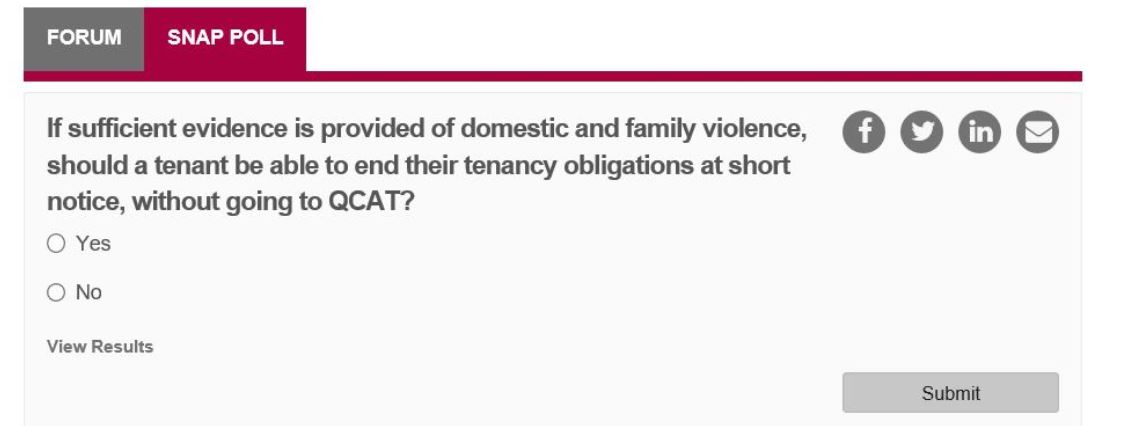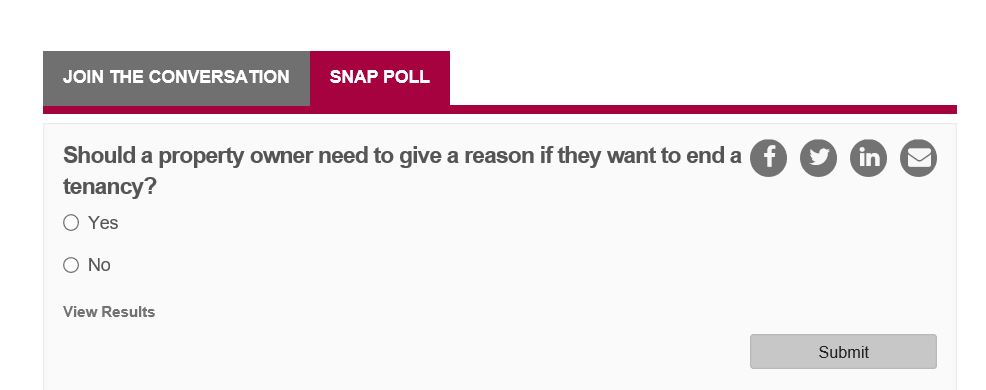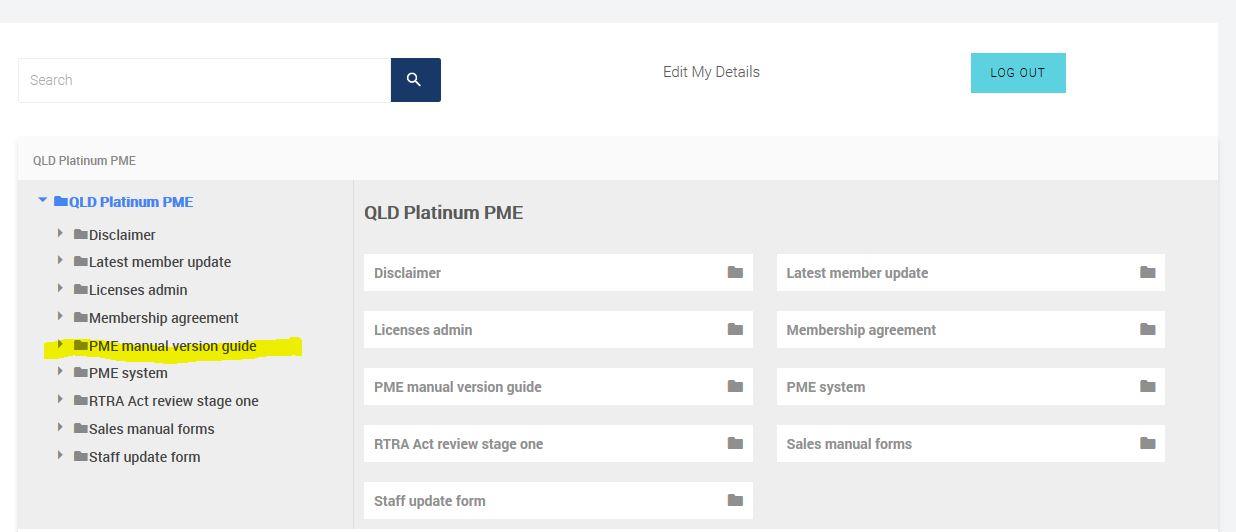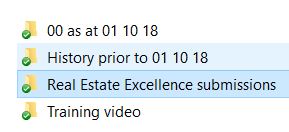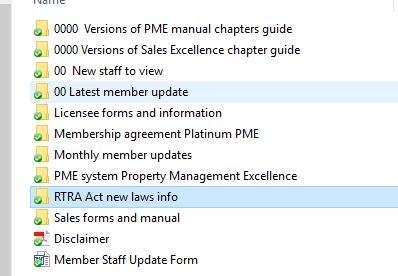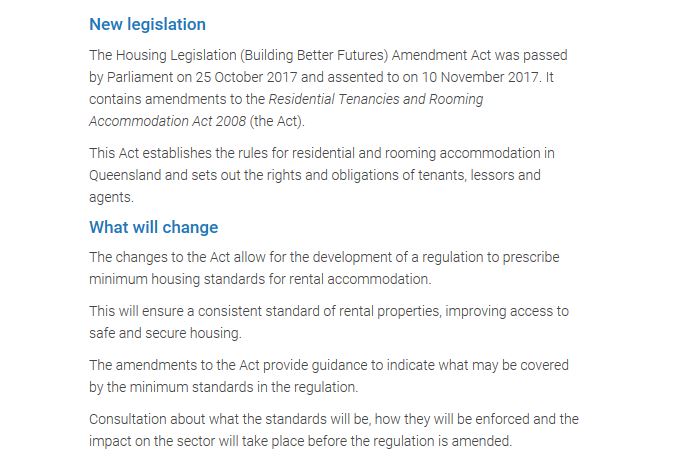RTRA Act review - Queensland tenancy law reform
Running blog in date order of events - author Stacey Holt. Scroll down the blog
Updates are and will be provided to Real Estate Excellence member offices via the Member Update service and posted in the private FB members only group Queensland member office private group. Updates and information are also provided as part of training events.
29th June 2021 - Have your say on proposed rental law reforms - From the RTA - sourced from www.rta.qld.gov.au Listen to short podcast regarding below here.
Queenslanders are encouraged to have their say on proposed rental law reforms for the state’s residential rental sector by 12 noon on Tuesday 13 July 2021.
The Queensland Government has recently introduced the Housing Legislation Amendment Bill 2021 to the Queensland Parliament with proposed reform areas including:
- ensuring all parties have appropriate approved reasons for all parties to end a tenancy
- prescribing Minimum Housing Standards
- options for people experiencing domestic and family violence to end a tenancy
- frameworks for all parties to negotiate renting with pets.
The Bill has been referred to the Community Support and Services Committee for detailed consideration. Queenslanders are encouraged to follow the discussion on this topic and have their say on the proposed changes through the Committee process by 13 July 2021.
Dr Amy MacMahon MP, Member for South Brisbane recently introduced the Residential Tenancies and Rooming Accommodation (Tenants’ Rights) and Other Legislation Amendment Bill 2021 (Bill) into the Queensland Parliament. This Bill has also been referred to the Community Support and Services Committee. You can follow the discussion on this Bill and provide your feedback on the proposed changes through the Committee process by 12 noon on Tuesday 13 July 2021 (amended timeframe). Enquiries to the Member for South Brisbane can be made to This email address is being protected from spambots. You need JavaScript enabled to view it. or (07) 3724 9100.
Making a submission
An information sheet with guidelines on making a submission on these Bills can be found on the Queensland Parliament website.
Written submissions can be emailed to This email address is being protected from spambots. You need JavaScript enabled to view it. or can be sent to:
Committee Secretary
Community Support and Services Committee
Parliament House
George Street
Brisbane Qld 4001
Documents relating to the committee's inquiries can be found on the inquiry webpages - Housing Legislation Amendment Bill 2021 and Residential Tenancies and Rooming Accommodation (Tenants' Rights) and Other Legislation Amendment Bill 2021.
24th June 2021 - An email has been sent to Real Estate Excellence Members.
Housing Legislation Amendment Bill 2021 - About the Bill
On 18 June 2021, Hon Leeanne Enoch MP, Minister for Communities and Housing, Minister for Digital Economy and Minister for the Arts, introduced the Housing Legislation Amendment Bill 2021 (Bill) into the Queensland Parliament. The Bill was referred to the Community Support and Services Committee for detailed consideration and report by 6 August 2021.
The Queensland Housing Strategy 2017-2027 (Housing Strategy) is a 10-year framework which aims to provide all Queenslanders with a better pathway to safe, secure and affordable housing. The explanatory notes state that the objective of the Bill is to deliver key objectives of the Housing Strategy, including:
- Modernisation - a commitment to reviewing and modernising rental laws to better protect tenants and lessors and improve housing stability in the rental market.
- Connections - ensuring that vulnerable community members are supported to sustain tenancies in appropriate and secure housing that facilitates social, economic, and cultural participation.
- Confidence - supporting a fair and responsive housing system through reforms to legislation and regulations that enhance the safety and dignity of all Queenslanders and promote the provision of a range of housing options that meet the diverse needs of Queenslanders.
The Bill aims to achieve its policy objectives by amending the:
- Residential Tenancies and Rooming Accommodation Act 2008, Residential Tenancies and Rooming Accommodation Regulation 2009 and Residential Tenancies and Rooming Accommodation (COVID-19 Emergency Response) Regulation 2020 to:
- support tenants and residents to enforce their existing rights by removing the ability for lessors and providers to end tenancies without grounds
- provide an expanded suite of additional approved reasons for lessors/providers and tenants/residents to end a tenancy
- ensure all Queensland rental properties are safe, secure, and functional by prescribing minimum housing standards and introducing compliance mechanisms to strengthen the ability to enforce these standards
- strengthen rental law protections for people experiencing domestic and family violence, and
- support parties to residential leases reach agreement about renting with pets.
- Retirement Villages Act 1999, to:
- provide certainty, security, and peace of mind to residents of freehold resident-operated retirement villages
- implement the intent of recommendations made during an independent review of timeframes for payment of exit entitlements in Queensland retirement villages, and
- create a framework to exempt freehold resident-operated retirement villages from the 18-month mandatory buyback requirements under the Retirement Villages Act 1999.
19th June 2021 Members listen to podcast re Bill here. And refer to Real Estate Excellence Member Update
Real Estate Excellence - Stacey Holt SHREE members private group - I will be studying the proposed bill today and in due course providing you with an overview. I will also advise regarding submissions for you and your lessor clients regarding the proposed changes. I suggest working on this Bill as opposed to the Greens Bill at this stage. You may wish to provide commentary to the Committee (for the Greens Bill) as you see fit (and your clients).
All upcoming Property Management Excellence PME - Stacey Holt special one day events will discuss proposed amendments specific to the session topics.
19th June 2021 Members listen to podcast re Bill here.
Real Estate Excellence - Stacey Holt SHREE members private group - I will be studying the proposed bill today and in due course providing you with an overview. I will also advise regarding submissions for you and your lessor clients regarding the proposed changes. I suggest working on this Bill as opposed to the Greens Bill at this stage. You may wish to provide commentary to the Committee (for the Greens Bill) as you see fit (and your clients).
All upcoming Property Management Excellence PME - Stacey Holt special one day events will discuss proposed amendments specific to the session topics.
Courier Mail 19 06 2021
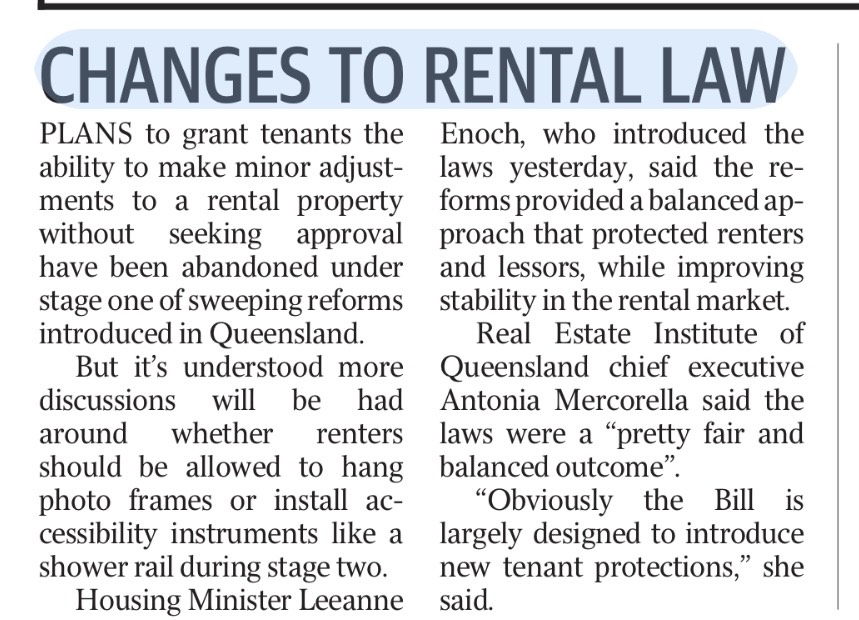
Sourced from The Courier Mail 19th June 2021 page 4
18th June 2021 - posted to Social Media including the Members only Facebook group and Instagram page
Courier Mail 17th June 2021
Labor look to be introducing their own tenancy amendment bill which will “knock” the Greens bill as they have majority Government.
Labor to introduce their own tenancy law Bill to Queensland Parliament. A new Property Management Excellence PME - Stacey Holt podcast. Listen here.
As stated in my podcast about below, the Devil is in the detail. A quote for CM article “Under newly proposed laws, a landlord will be able to decide not to offer a tenant a renewed contract if they do not wish to, but they will not be able to issue a notice to leave “without grounds”, giving tenants more certainty.”
Real Estate Excellence members, we shall update you more once more information and facts are available.

12.30pm 18th June 2021

Media Release
Minister for Communities and Housing, Minister for Digital Economy and Minister for the Arts
The Honourable Leeanne Enoch
Palaszczuk Government moves to make renting fairer
The Palaszczuk Government is delivering on its commitment to make renting fairer, with the introduction of new legislation into Queensland Parliament today.
The proposed laws will make it easier for Queensland renters to have a pet, and end ‘without grounds’ evictions, providing more certainty about ending a lease.
Minister for Communities and Housing Leeanne Enoch said the proposed reforms provide a balanced approach and help deliver certainty for the 34 per cent of Queensland households who rent.
“Queenslanders rely on safe, secure and affordable housing and we’re delivering on our election commitments to improve confidence in the rental market,” Ms Enoch said.
“The new laws provide a strong, balanced approach that protects the rights of renters and lessors, while improving stability in the rental market.
“At a time when more Queenslanders are renting, and renting for longer, we need to encourage market growth to help increase the number of rental properties in Queensland, while also protecting the rights of tenants.
“Our legislation strikes the right balance between the needs of the community, while also supporting continued investment in the housing market.”
The new laws will ensure all Queensland rental properties meet minimum quality standards, will provide clarity about the end of a tenancy, and will make it easier for renters to have a pet.
“We are also ensuring people fleeing domestic and family violence are able to end a lease with seven days’ notice, to ensure there is no barrier to being able to end a lease quickly and safely.”
These reforms progress Stage 1 of the Palaszczuk Government’s rental law reforms.
Ms Enoch said that some of the proposed renting reforms, such as the domestic and family violence measure, were tested during the COVID-19 pandemic.
“These reforms have been proposed following public consultation, to ensure all Queenslanders could have their say.
“We also received over 135,000 responses through the Open Doors to Renting Reform consultation, and over 15,000 responses when we consulted on Stage 1 reforms through the Regulatory Impact Statement,” Ms Enoch said.
Minister Enoch said the Greens’ renting Bill which was introduced in May would make it less likely that an owner would rent out their property.
“What we need right now are more rental properties available for Queenslanders and their Bill will do the exact opposite.
“Once again, the Greens have demonstrated they are incapable of balanced and responsible policy-making,” Ms Enoch said.
Ms Enoch said that seniors living in resident-operated retirement villages would also benefit from the amendment legislation introduced today.
“The proposed changes will deliver on another of our election commitments, to enable resident-operated retirement villages to be exempted from mandatory buyback requirements under the Retirement Villages Act 1999,” she said.
“This will provide certainty and peace of mind to a small number of retirement villages where residents control and operate the retirement village themselves.”
Real Estate Institute of Queensland CEO Antonia Mercorella said the government consulted extensively with various stakeholders to seek a fair and balanced outcome in the renting reforms.
“We recognise that tenancy laws in Queensland must be modernised to keep pace with our changing rental landscape. In circumstances where 36% of our community rent their homes, the right regulatory framework is critically important to provide security and certainty to both tenants and owners,” Ms Mercorella said.
Micah Projects CEO Karyn Walsh said the domestic violence provisions in the Bill were vital during the COVID-19 health emergency.
“I applaud the Government for ensuring that these provisions will remain in legislation. Being able to leave a tenancy without a financial burden is an important consideration for women and families fleeing domestic violence,” Ms Walsh said.
ENDS
Media contact: 0437 859 987
What the new renting laws will do:
- Establish minimum standards to ensure all Queensland rental properties meet standards for safety, security and functionality. This includes making sure accessible windows and doors have functioning latches, kitchen and laundry facilities are in good repair and do not present a safety risk with normal use, and properties are weatherproof and structurally sound.
- Provide clear approved grounds for how a tenancy can be terminated. For a lessor, this can include: end of the agreed term under a fixed term lease, significant repair or renovation needing to occur, sale of property, and owner occupation. Lessors will also be able to seek an order from the Queensland Civil and Administrative Tribunal to terminate the tenancy for significant or serious breach of the lease by a tenant. For a tenant, this can include: property not being in good repair and not complying with minimum standards, lessor provided false or misleading information about the lease or property, co-tenant is deceased.
- A property owner will not be able to issue a notice to leave ‘without grounds’, providing tenants with more certainty.
- A tenant can end their interest in a lease with seven days’ notice if they are unable to safely continue it because they are experiencing domestic and family violence.
- If a tenant requests to keep a pet, a lessor must have reasonable grounds to refuse and respond in writing to this request within 14 days. Reasonable grounds include if the property is unsuitable, and if keeping the pet would breach laws or by-laws. Lessors can also place reasonable conditions on pet ownership, including that the pet is to be kept outside or that carpets are cleaned and the property is fumigated at the end of a lease. Rent increase is not a reasonable condition. The laws also clarify that fair wear and tear does not include pet damage.
15th June 2021
Dear Members, (part of email sent shown below)
Further to my email to you Sunday, I have written overnight to the Minister for Housing. Please read below. Watch short video An update for Real Estate Excellence members regarding the tenants rights bill - YouTube - The FB and Instagram private member groups mentioned in the video details Contact and Connect (realestateexcellence.com.au)
13th June 2021 - RTRA Act Bill update - As it happens Member update - emailed to Members 13th June 2021
Good morning members, Please refer to information below and an update regarding the RTRA Act proposed amendments introduced to Parliament and as advised to you in the June Real Estate Excellence Member Update. As advised in the June Member update, the bill has been passed to a committee for review. The committee is calling for submissions regarding the Bill. I shall advise members of any further updates accordingly. More information is provided in the email to Members with a copy in the latest Member update folder at Member online / folder Latest Member Update - As it happens member update June 2021.
27th May 2021
RTRA Act amendment bill in Queensland Parliament. Members please watch short video here. Or, listen to podcast here.
5th March 2021
Below sourced from here on 5th March 2021.
The reform process | Renting in Queensland
Consultation has concluded
We’re reviewing Queensland’s tenancy laws to ensure the rental needs of Queenslanders are met now and in the future.
- First, we heard the community’s views about renting through the Open Doors to Renting Reform consultation.
- Our Reform Roadmap (PDF, 2 MB)outlines our response to the consultation findings and sets out a two-staged approach to a better renting future for Queensland.
- We sought your feedback on options to improve renting in Queensland in the Stage 1 Better Renting Future Consultation Regulatory Impact Statement RIS (PDF, 2.88 MB).
Next, we will analyse your feedback and prepare a Decision Regulatory Impact Statement to reflect the outcomes of consultation before introducing a Bill to change tenancy laws.
Open Doors to Renting Reform consultation
In 2018, the statewide Open Doors to Renting Reform community consultation invited Queenslanders to share their rental experiences and ideas about how to improve renting in Queensland.
We received over 135,000 responses and had conversations with tenants, property owners and property managers about their experience of living in, owning or managing a rental property and how it could be improved.
Open Doors consultation outcomes
We heard clearly that renting is an important issue for Queenslanders and there is support for change to our tenancy laws.
We heard that all Queenslanders want to feel safe and secure in the rental market, either as a tenant enjoying the property as their own home, or as an owner protecting the property as their investment.
However, different views were held about what reforms are needed to strike the right balance between these interests.
- Read the Open Doors to Renting Reform Consultation Report (PDF, 3.58 MB), which summarises the feedback we received and provides consultation insights.
Reform Roadmap
The Reform Roadmap (PDF, 2 MB) outlines our response to the Open Doors consultation and a two-stage pathway to deliver fair and workable tenancy laws, including:
- actions to support tenants to enforce their existing rights, ensure rental accommodation is safe, secure and functional, and improve liveability and certainty in the rental market, and
- further engagement with the community and sector to design workable solutions to renting issues where we found a wide range of views are held.
Consultation Regulatory Impact Statement
The Stage 1 Better Renting Future Consultation Regulatory Impact Statement (PDF, 2.88 MB) outlined a range of policy options to change Queensland's tenancy laws and their potential impacts, and identified recommended reforms across 5 priority areas:
- Minimum Housing Standards
- Renting with pets
- Minor modifications
- Domestic and family violence
- Ending a tenancy fairly.
Consultation on these proposals is now closed and the community feedback received will inform future policy decisions made by the Government to ensure we get tenancy law reforms right.
Read more here
11th November 2020 - 2021 and residential tenancy law
With the Labor Government re-elected for its third term on 31st October 2020, the proposed tenancy changes due in 2020 will most likely proceed in 2021. The proposed changes under Labor were poised to be introduced into Parliament as per their public schedule and then Covid began. The proposed laws were paused and the Covid temporary tenancy regulations were created. A comprehensive outline of the proposed changes was provided to Members of Real Estate Excellence as part of the December 2020/January 2021 Member Update service.
The following blog is in date order of events, announcements and submissions. Please scroll down to review. The blog begins (from the bottom of the blog) from when the Act started being reviewed in 2012, then 2014 and the Government housing strategy release in 2016. The Act was amended 10 November 2017 to allow for the regulation of minimum housing standards for Queensland rental property. The regulation is yet to be released for minimum housing standards. (as noted below in date order of blog) Stacey Holt www.qld.gov.au/rentinginqld
24th September 2020 - A short video update regarding the Queensland tenancy law review here.
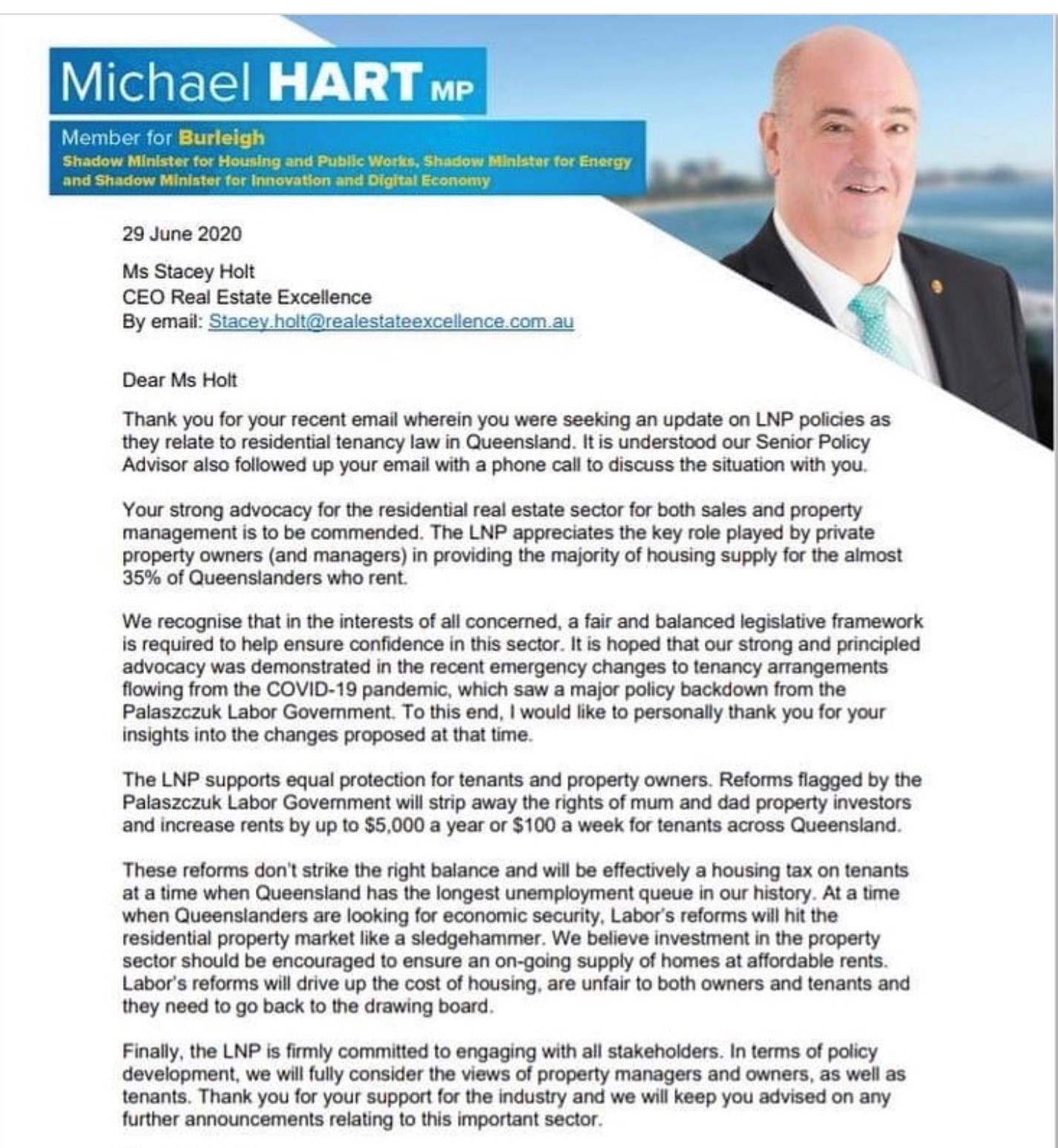
December 12 2019 - My final statement and submission regarding the 'tenancy law reform' - RTRA Act review
Real Estate Excellence – Stacey Holt
Submission to the Queensland Labor Government
Regulatory Impact Statement
There should be further consultation after the closing of the RIS on 28th December 2019 with all the sector by the Government releasing the draft Act and regulations amendments. This would be a more democratic, reasonable and just way to truly achieve the outcome of making renting fair for all parties. The Queensland Civil and Administrative Tribunal (QCAT) which commenced in December 1, 2009 should also be reviewed as part of tenancy law reform. QCAT is made up of 24 tribunals; as part of this review, the tenancy arm of the Tribunal should be reviewed with tenancy law reform.
The Labor Government of Queensland has conducted the review of rental tenancy laws in Queensland in such an extraordinary way and have created a lot of uncertainty, and some fear for investors and the Real Estate industry.
The review carried out in 2018 was arduous, complex and lengthy. Most in the sector would not have had the time to keep up with the review for what turned out to be almost three months in length.
The reported statistic of 2% of the property management industry contributed to the 135 000 responses is not correctly represented given organisations such as my company Real Estate Excellence who has over 250 agency member offices, the REIQ, PPM Group and Real Estate Dynamics to name other substantial industry representation and membership.
The Minister for Housing posted on his social media page recently regarding taking the pledge relating to victims of domestic and or family violence in tenancies having an easier option to end tenancies. What was disappointing and has added to fear, possible anger and confusion by many in the sector, is the Minister called for people to take the ‘pledge’ and sign an online submission to support people in these terrible situations in relation to tenancy law. What was most disappointing, and quite a shock is the link to the Labor Party website to complete and ‘sign’ support, stated that by taking the pledge, people agree to ending revenge evictions, minimum housing standards, tenants right to make modifications and right to have pets, plus tenant right to end tenancies who are victims of family and domestic violence.
Strategies such as what have been used by the Minister, and other members of the Labor party have only escalated the confusion, fear and uncertainty. The RIS is meant to discuss the Government preferred option and call for feedback from all parts of the sector; the language and behaviour of Government during the review, and now the consultation stage shows a great bias towards any constructive feedback and a very unbalanced approach. I will discuss the matter of without grounds further shortly, however, it must be said that Government language verbally and in writing of stopping revenge and or retaliatory evictions is aggressive, embellished and without substantiated evidence it occurs. There appears to be only anecdotal evidence. In my review and knowledge of QCAT cases over these last ten years, there have been three decisions/appeals published regarding retaliatory eviction applications. Not all decisions or appeals are published. If this is such as widespread issue, where are the RTA statistics of fact from their call centre, and or dispute resolution?
This critical stage of consultation, and the Regulatory Impact Statement is lacking in detail and is disappointing. Whilst the 170-page document is detailed, it is lacking in detail.
What is needed for such as substantial change to legislation is detail. Where are the proposed amendments to review and comment on? The timeline provided by the Government states the next stage is the decision of the RIS and then the bill, I cannot see there will be further consultation to what is most important, the facts. The bill will then be introduced into Parliament.
Most of the RIS is unbalanced and not fair or just to all parties. There is one possible benefit for an investor being the proposed introduction of a notice to leave for serious breach. This has long been lacking in the industry, particularly with drug use, manufacturing and contamination being a concern within the sector. All other proposed reforms potentially benefit tenants only. This is not about the investor right or control; though some certainly feel disempowered and fearful about their investment of hundreds of thousands of dollars. A reasonable person would understand that fear and Government are attempting to dictate how an investor can decide the future of their investment. Investment is a private business.
Government should be focusing on purchasing land, properties, and creating affordable rental housing. There appears to be a deliberate intent of Government imposing their obligations onto private investors, plus increasing compliance, therefore cost. The smoke alarm law second tranche that began in 2017 is due to expire December 31, 2021. Investors have this cost, along with unknown other requirements regarding minimum housing standards. It is fear of loss of control, rights to make decisions about investments, and the affordability and risk of having such investments that is making the sector uneasy. The property is an investment for an investor and is not bought to fulfil a much-needed supply of social and affordable housing; that is the role of Government of which we pay substantial tax for.
I am not disputing property needs to be safe, and fit to live in. Ever since the RTRA Act was first put under review in 2012 by the former LNP Government, I have supported the existing laws as provided in my submission in 2018 when the review was carried out. A parliamentary committee stated in 2014 the law did not need to be amended as shown in extract below.
Public tax payer monies should have been focused on education and informing people of their rights (tenants), and investors of their obligations with what is currently in law. Instead, increased red tape and cost is being introduced.
Regarding the further proposed changes in the RIS regarding minor modifications, sections 217 to 219 cover tenant and lessor obligations and rights regarding making changes. There was and is no need for further legislation to complicate and confuse a matter which is already provided for in the legislation.
The sector should know at this stage of the review of such important legislation for many the following;
- What are the proposed reasonable grounds for a lessor to refuse a pet?
- What is the definition of minor modification?
- Why is the time frame for response only 7 days? A more reasonable time frame to allow for contact, discussion and negotiation is recommended to be 14 days.
- What detail will be in the legislation regarding returning the property in the same condition if minor modification without approval, or with fast-track approval?
- What are the minimum housing standards going to be?
- This is most disappointing given section 17A was inserted, and section 185 amended by the Government in November 2017. Given all this time, it is disappointing they have not been provided for a more constructive consultation. People do not know what they are disputing, agreeing to or in part agreeing to etc.
- Increased repair and maintenance provisions in the RIS state RTA prosecution as an option for non-compliance of QCAT repair orders. Again, there is no detail to constructive consult and or give feedback on this matter.
- Providing property managers authority regarding emergency repair authorisation is of concern given the PO Act and the OFT regulate the industry as opposed to the RTA. What is further of concern is section 22 of the AFA Act prohibits agencies from drawing trust account monies from a client’s ledger to pay accounts such as contractors without the clients written authority. Providing authority in the RTRA Act for property agents to authorise emergency repairs is possibly putting businesses at risk, as the industry legislation states the actual account cannot be paid without client written consent.
- Are the RTA going to also regulate property agents, and will there be amendments to the PO and AFA Act to allow and cover such proposed authorise in the RTRA Act?
In relation to Domestic and Family violence being a reason a tenant can provide notice is supported in part; the time frame for notice should be more reasonable and be 14 days. The ability for a cotenant to give 21 days’ notice when a victim terminates due to violence, should not proceed. Any people named on the tenancy contract who are on the lease have other ways to end the tenancy and if they are not the effected party, should not be given a provision to end a tenancy when they are not the victim.
Without grounds as a reason to end a fixed term tenancy has long been an emotive issue within the industry. The proposed preferred Government option of removing the without grounds as a reason to end a fixed term or period tenancy contract and replace with prescribed reasons is a highly controversial matter. What about the Australian Consumer Law (ACL) and the unfair contract terms; isn’t such proposed terms in a contract unbalanced and give more power to one party over another. The tenant should have a home; but it is not their property, it is the property of the investor.
An unintended consequence which appears to not have been considered is Landlord insurance and risk. Most landlord insurance policies provide no, or limited coverage for periodic tenancies. Common practice of industry since the notice to leave without grounds provision was increased to two months in 2009 is for lessors to be contacted by their agents around 2.5 to 3 months prior to a fixed term agreement contract expiring. The only reason this best practice procedure occurs is in the event the lessor wishes for the tenancy contract to end at the end of the fixed term agreement, and the two months’ notice can be provided to the tenant.
The RIS notes Queensland has some of the highest fixed term tenancy contracts in Australia. The reason this would long be the case is due to security of all parties, best practice and particularly, landlord insurance. If a tenant is offered a new agreement contract (lease renewal), and refuses to enter into a lease renewal, the tenancy reverts to a periodic. This leaves the investor in a serious position of risk due to reasons noted above; most lessor insurance policies provide limited and no coverage in the event of loss if a tenancy contract is periodic. Due to insurance and management of risk and security, tenants may be given a notice to leave without grounds if they do not wish to enter into a new tenancy agreement (leaser renewal).
Most tenants are good people, as are most investor lessors and agents. Bad things happen to good people meaning if the tenant does not want to enter into a lease renewal agreement, as they want the flexibility of a periodic lease, and the lessor does not have a proposed prescribed reason to end the tenancy, the investor is left in a dangerous position if the tenant situation and life changes. Examples include addiction, job losses, relationship dispute as opposed to violence and more. In the event the good tenancy ‘goes bad’, and the lease is periodic, there is great risk of loss to the investor. Is there a possibly of introducing a reason to give notice to leave is if the tenant does not enter into a fixed term agreement when offered? It appears tenants want security, and increased rights to make the investors property their home, but also want the flexibility. That is unfair to the investor who carries all the risk and cost of the investment property and is not a balanced approach of Government.
There are genuine concerns that investors may leave the market due to their loss of right to end a tenancy contract for their asset without grounds for the reasons stated in this submission. This is a possibly the Government cannot find afford to risk, given supply and demand drive rental market price, plus, the lack of social housing and homelessness. All parties most likely will suffer should the removal of without grounds proceed.
The solution to the minority of lessors who the Government call the ‘retaliatory and revenge eviction’ is to introduce a penalty unit provision if a tenant is provided a without ground notice in breach of section 291, with section 292 allowing for tenant to make complaint to the RTA if there is an alleged breach of the lessor in giving a notice to leave without grounds during a fixed term, and or periodic contract.
My understanding is Tenants Queensland have long expressed concern regarding section 292 in the tenant must ‘action’. The action being applying to tribunal within 4 weeks of being given a notice to leave and it is thought to be retaliation to a tenant utilising their rights, such as issuing a breach to lessor for alleged breach of their maintenance obligations under section 185.
The option of introducing a penalty for the issuing of a notice to leave without grounds is a win for all parties; and provides the tenant an effortless cost free option of complaining to the RTA for review of the notice to leave without grounds given in breach of section 291. The RTA should have the option of setting the notice aside, plus opposing a penalty if upon their usual investigation procedures finds the lessor is in breach.
There may be administration burden for the RTA; however, this should not deter the Government consideration given the serious risks involved for all parties should notice to leave without grounds be removed from the legislation as noted above. Given the number of QCAT decisions relating to retaliatory evictions in the last ten years, a substantial administration burden is not expected to occur for the RTA. This is a matter that could be reviewed in the years to come. The Government can fix this so-called widespread industry practice which is greatly disputed by introducing a penalty unit offence and ability to set aside a notice to leave without ground if it is found there has been a breach by the lessor of section 291.
Most of the unbalanced proposed reforms require an action of the lessor investor and or agent to take a matter to QCAT; such as refusing a pet (reasonable grounds unknown), and minor modifications not agreed to. As stated earlier, my understanding is Tenants Queensland have long had concerns that tenants have to take an ‘action’ such as apply to QCAT to enforce their rights they believe are being breached. It is proposed in the RIS that it will all fall on the investor lessor and or their agent to act for these matters. Again, this is very unfair and unbalanced approach.
Tenants have the right and should have to make the property their home. But the reality is, it is not their property. It is their home for the terms of the legal contract. Investors who are carrying all the cost and risk, should have a say as in any business transaction as to what occurs with their investment and not be dictated by Government. Government should create more housing and focus on policy for housing people to have homes for life as part of social housing.
There should be further consultation after the closing of the RIS on 28th December 2019 with all the sector by the Government releasing the draft Act and regulations amendments. This would be a more reasonable and just way to truly achieve the outcome of making renting fair for all parties.
Yours sincerely
Stacey Holt
Company Director
Real Estate Excellence
www.realestateexcellence.com.au
December 10 2019 - Tenants Queensland event
I was asked to speak as a panelist at a Tenant Queensland event "Generation rent needs a home" on the 10th December 2019. My notes for this event can be heard as a podcast here.
December 9 2019 - Minimum housing standards submission Real Estate Excellence
If you agree with my submission below, you are welcome to copy and paste, make any final edits and submission to the review by 28th December 2019. Give feedback to the Queensland Labor Government here.
I write in response to the Regulatory Impact Statement regarding proposed minimum housing standards.
As stated in my submission during the review in 2018 (further down in this submission), again, it is difficult to provide constructive and meaningful feedback in relation to proposed minimum housing standards as there is little detail provided in the RIS as to what the minimum housing standards mean. By not releasing the actual draft regulation at this point of the reform, Government are greatly disadvantaging investors by not enabling a constructive and fair consultation regarding proposed standards.
Under the proposal, all rental properties in Queensland would need to meet certain standards addressing:
- weatherproofing and structural soundness
- plumbing and drainage
- security
- the standard of repair of fixtures and fittings
- control of pests and vermin
- ventilation, lighting and privacy
- cooking and food preparation facilities
We are also recommending changes to ensure that property owners and managers comply with the Minimum Housing Standards and basic requirements for repairs and maintenance. These include:
- enhanced QCAT repair orders
- an increase in the time allowed for a tenant to return a condition report
- a requirement for property owners to provide key contact details for emergency repairs
- an increase in the value of emergency repairs that can be authorised by a tenant
- a new authority for property managers to approve emergency repairs, if the owner is unavailable
Given section 17A and amended section 185 have been in place since 2017, it is a great concern for transparency and a fair balanced approach, the Government have not released the regulations in draft as part of this stage of the rental reform review. It is hoped to have the draft regulations for further consultation before a Government decision is finalised moving forward.
22nd October 2018
It is difficult to provide constructive feedback to the “Property condition join the conversation’ discussion of the RTRA Act review when the regulations required to provide the actual definition of the minimum housing standards are not yet available. Given the amendment to section 185 and the introduction of section 17A as at November 2017 are already in play, further detail should be provided to the sector to allow for a more informed feedback. Any proposed and or draft regulations are needed to provide a constructive platform regarding the impact and benefit (or lack of) to the private rental sector in relation to the proposed minimum housing standards. The questions (as per the website below as at 18th October 2018) are too broad and need further explanation. It is assumed that part of the Government review expectation, is via the feedback provided from tenants, lessors and agents to the questions below, more information will be clarified for the sector moving forward before regulations are introduced.
185 Lessor’s obligations generally:
(1) This section does not apply to an agreement if –
(a) the premises are moveable dwelling premises consisting only of the site for the dwelling; and
(b) the tenancy is a long tenancy (moveable dwelling).
(2) At the start of the tenancy, the lessor must ensure –
(a) the premises and inclusions are clean; and
(b) the premises are fit for the tenant to live in; and
(c) the premises and inclusions are in good repair; and
(d) the lessor is not in breach of a law dealing with issues about the health or safety of persons using or entering the premises; and
(e) the premises and inclusions otherwise comply with any prescribed minimum housing standards applying to the premises or inclusions.
[s 185]
(3) While the tenancy continues, the lessor –
(a) must maintain the premises in a way that the premises remain fit for the tenant to live in; and
(b) must maintain the premises and inclusions in good repair; and
(c) must ensure any law dealing with issues about the health or safety of persons using or entering the premises is complied with; and
(d) if the premises include a common area—must keep the area clean; and
(e) must ensure the premises and inclusions otherwise comply with any prescribed minimum housing standards applying to the premises or inclusions.
Note—
See section 217 for the tenant’s obligations to notify the lessor about damage to premises and the need for repairs.
(4) However, the lessor is not required to comply with subsection (2)(c) or (3)(a) for fixtures attached to premises, and inclusions supplied with premises, (the non-standard items) if—
(a) the lessor is—
(i) the State; or
(ii) the replacement lessor under a community housing provider tenancy agreement; and
(b) the non-standard items are specified in the agreement and the agreement states the lessor is not responsible for their maintenance; and
(c) the non-standard items are not necessary and reasonable to make the premises a fit place in which to live; and
(d) the non-standard items are not a risk to health or safety;
and
(e) for fixtures—the fixtures were not attached to the premises by the lessor.
[s 186]
(5) In this section— premises include any common area available for use by the tenant with the premises.
Division 4 Prescribed minimum housing standards
17A Prescribed minimum housing standards
(1) A prescribed minimum housing standard means a standard prescribed by a regulation.
(2) A regulation may prescribe minimum housing standards for—
(a) a residential premises let, or to be let, under a residential tenancy agreement; or
(b) a rental premises; or
(c) inclusions for premises; or
(d) facilities in a moveable dwelling park (park facilities).
(3) A prescribed minimum housing standard may be for any matter relating to the premises, inclusions or park facilities, including, for example, the following—
(a) sanitation, drainage, cleanliness and repair of the premises, inclusions or park facilities;
(b) ventilation and insulation;
(c) protection from damp and its effects;
(d) construction, condition, structures, safety and situation of the premises, inclusions or park facilities;
(e) the dimensions of rooms in the premises;
(f) privacy and security;
(g) provision of water supply, storage and sanitary facilities;
(h) laundry and cooking facilities;
(i) lighting;
(j) freedom from vermin infestation;
(k) energy efficiency.
[s 18]
(4) If a regulation made under subsection (2) makes provision in relation to a matter and provision is also made in relation to that matter by, or under, any Act, the regulation—
(a) if not inconsistent with the Act, must be observed in addition to that Act; and
(b) if inconsistent with the Act, is, to the extent of the inconsistency, of no force or effect and that Act prevails.
Example of inconsistency between a prescribed minimum housing standard and an Act—
A prescribed minimum housing standard, that purports to require a lessor to keep residential premises and inclusions clean after the start of a tenancy, is inconsistent with the obligations of a tenant under section 188(2).
(5) A regulation may also prescribe how compliance with minimum housing standards is to be monitored and enforced.
(6) In this section— premises means premises mentioned in subsection (2)(a) or (b).
Extract from the review website below.
Property condition
Every Queenslander has a right to live in a safe, secure and sustainable home.
It’s important that rental properties across the state are fit to live in and stay in good repair throughout a tenancy.
Property owners must ensure rental premises and inclusions provide a safe environment for tenants, while tenants have a responsibility to look after the rental property, keeping it clean and in good order.
This week, we want to hear your experiences and ideas about minimum housing standards in a rental property, repairs and maintenance, and energy efficiency options to minimise cost of living.
Every Queenslander has a right to live in a safe, secure and sustainable home.
It’s important that rental properties across the state are fit to live in and stay in good repair throughout a tenancy.
Property owners must ensure rental premises and inclusions provide a safe environment for tenants, while tenants have a responsibility to look after the rental property, keeping it clean and in good order.
This week, we want to hear your experiences and ideas about minimum housing standards in a rental property, repairs and maintenance, and energy efficiency options to minimise cost of living.
Tell us what you think:
- What do you think are acceptable standards for the condition of rental properties?
- What standards of safety should Queensland rental properties be required to meet?
- What should happen if minimum standards are not met?
- How would minimum standards for rental accommodation impact you as a tenant, owner or manager?
Tell us what you think:
- What do you think are acceptable standards for the condition of rental properties?
- What standards of safety should Queensland rental properties be required to meet?
- What should happen if minimum standards are not met?
- How would minimum standards for rental accommodation impact you as a tenant, owner or manager?
Bottom of Form
Tell us what you think:
- What does ‘clean’, ‘fit to live in’ and ‘in good repair’ for rental properties mean for you?
- How could managing the ongoing repair and maintenance of rental properties be improved?
- How can we improve the way in which damage caused to a Queensland rental property is dealt with?
Tell us what you think:
- What does ‘clean’, ‘fit to live in’ and ‘in good repair’ for rental properties mean for you?
- How could managing the ongoing repair and maintenance of rental properties be improved?
- How can we improve the way in which damage caused to a Queensland rental property is dealt with?
Bottom of Form
Tell us what you think:
- How could energy and water efficiency of rental properties be improved?
- What would encourage energy and water efficiency features to be included in rental properties, like solar panels or water saving devices?
Tell us what you think:
- How could energy and water efficiency of rental properties be improved?
- What would encourage energy and water efficiency features to be included in rental properties, like solar panels or water saving devices?
Top of Form
Bottom of Form
Tell us what you think:
- How can housing design and safety measures be improved in the rental market?
- What reasonable modifications should tenants be allowed to make for safety reasons?
Tell us what you think:
- How can housing design and safety measures be improved in the rental market?
- What reasonable modifications should tenants be allowed to make for safety reasons?
With the limited information available without the regulations, the following feedback is hereby provided;
Whilst the focus and importance of having safe rental properties is paramount, the cost for compliance to the sector and the possible impact to the private rental market could be catastrophic to say the least to all parties involved, including tenants which may see rents rise to recoup the possible costs to investors.
Landlords (lessors) already have clear statutory obligations in relation to ensuring properties are safe and fit to live in through section 185. If landlords fail in their obligations, tenants could utilise their many rights to ensure the landlord meets their legislative obligation.
Tenants already have adequate rights when it comes to maintenance concerns of rental property particularly given the overarching provision of section 185 relating to landlord obligations. They can choose, depending on the situation one of more of the following;
- Breaching the lessor under section 185 of the RTRA Act
- Applying to the RTA dispute resolution via form 16
- If the matter is unresolved, apply to tribunal for an order about the matter
- Apply to tribunal via section 191 if the criterion is met
- Seek a rent reduction under section 94
It is strongly recommended before the proposed bill moves forward in relation to minimum housing standards, more information is provided to the sector to enable a more informed debate surrounding what the Government is proposing to be minimum housing standards for Queensland rental property.
Yours sincerely
Sent via email This email address is being protected from spambots. You need JavaScript enabled to view it.
Stacey Holt
Company Director
Real Estate Excellence Academy Pty Ltd
December 8 2019 - Removal of without grounds provision Real Estate Excellence submission
Important - Please watch if you’re in Queensland regarding the proposed removal of without grounds (reason) provision to end a tenancy agreement contract.
A huge unintended consequence that I’ll be adding to my feedback. Watch here.
Real Estate Excellence submission provided to Government regarding the proposed removal of notice to leave without grounds to end a tenancy. You are welcome to copy and paste and provide to Goverment in your own right should you agree.
Thank you for the opportunity to provide this submission in response to the Regulatory Impact Statement (RIS).
This submission relates to the Government preferred option to remove the without grounds provision of ending a tenancy in Queensland and replacing with prescribed reasons along with the existing provisions.
As per the submission provided during the review in 2018 (supplied further down this submission), there are further reasons why the Government need to consider another approach regarding the ending of tenancies.
An unintended consequence which appears to not have been considered is Landlord insurance and risk. Most landlord insurance policies provide no, or limited coverage for periodic tenancies. Common practice of industry since the notice to leave without grounds provision was increased to two months in 2009 is for lessors to be contacted by their agents around 2.5 to 3 months prior to a fixed term agreement contract expiring. The only reason this best practice procedure occurs is in the event the lessor wishes for the tenancy contract to end at the end of the fixed term agreement, and the two months’ notice can be provided to the tenant.
The Regulatory Impact Statement notes that Queensland has some of the highest fixed term tenancy contracts in Australia. The reason this would long be the case is due to security of all parties, best practice and particularly, landlord insurance. If a tenant is offered a new agreement contract (lease renewal), and refuses to enter into a lease renewal, the tenancy reverts to a periodic. This leaves the investor in a serious position of risk due to reasons noted above; most lessor insurance policies provide limited and no coverage in the event of loss if a tenancy contract is periodic. Due to insurance and management of risk and security, tenants may be given a notice to leave without grounds if they do not wish to enter into a new tenancy agreement (leaser renewal).
Most tenants are good people, as are most investor lessors and agents. Bad things happen to good people meaning if the tenant does not want to enter into a lease renewal agreement, as they want the flexibility of a periodic lease, and the lessor does not have a proposed prescribed reason to end the tenancy, the investor is left in a dangerous position if the tenant situation and life changes. Examples include addiction, job losses, relationship dispute as opposed to violence and more. In the event the good tenancy ‘goes bad’, and the lease is periodic, there is great risk of loss to the investor.
There are genuine concerns that investors may leave the market due to their loss of right to end a tenancy contract for their asset without grounds. This is a possibly the Government cannot find afford to risk, given supply and demand drive rental market price, plus, the lack of social housing and homelessness. All parties will suffer should the removal of without grounds proceed.
The solution to the minority of lessors who the Government call the ‘retaliatory and revenge eviction’ is to introduce a penalty unit provision if a tenant is provided a without ground notice in breach of section 291, with section 292 allowing for tenant to make complaint to the RTA if there is an alleged breach of the lessor.
Of my review and knowledge of all QCAT published decisions and appeals during the last ten years, my understanding is there are three known cases that involve retaliatory eviction. Not all decisions and appeals are published. It is an indication the matter of lessors giving a notice to leave in breach of section 291 may not be as widespread as stated by Government in the Regulatory Impact Statement, media statements and social media posts.
My understanding is Tenants Queensland have long expressed concern regarding section 292 in the tenant must ‘action’. The action being applying to tribunal within 4 weeks of being given a notice to leave and it is thought to be retaliation to a tenant utilising their rights, such as issuing a breach to lessor for alleged breach of their maintenance obligations under section 185.
The option of introducing a penalty for the issuing of a notice to leave without grounds is a win for all parties; and provides the tenant an effortless cost free option of complaining to the RTA for review of the notice to leave without grounds given in breach of section 291. The RTA should have the option of setting the notice aside, plus opposing a penalty if upon their usual investigation procedures finds the lessor is in breach.
There may be administration burden for the RTA; however, this should not deter the Government consideration given the serious risks involved for all parties should notice to leave without grounds be removed from the legislation as noted above. Given the number of QCAT decisions relating to retaliatory evictions in the last ten years, a substantial administration burden is not expected to occur for the RTA. This is a matter that could be reviewed in the years to come. The Government can fix this so-called widespread industry practice which is greatly disputed by introducing a penalty unit offence and ability to set aside a notice to leave without ground if it is found there has been a breach by the lessor of section 291.
22nd October 2018
Section 291 of the RTRA Act clearly sets out when a notice to leave without reason cannot be given to a tenant.
Section 292 protects tenants who believe a lessor has contravened the provision.
Therefore, there is no need to add increased legislation unnecessarily.
Investors should always have the right to lawfully terminate a tenancy without reason. If investors comply with legislation, a lessor should have the right of possession without having to state a reason. Tenants are protected if lessors act outside the legislation. This is fair and balanced for all parties.
291 Notice to leave without ground
(1) The lessor may give a notice to leave the premises to the tenant without stating a ground for the notice.
(2) However, the lessor must not give a notice to leave under this section because—
(a) the tenant has applied, or is proposing to apply, to a tribunal for an order under this Act; or
(b) the tenant—
(i) has complained to a government entity about an act or omission of the lessor adversely affecting the tenant; or
(ii) has taken some other action to enforce the tenant’s rights; or
(c) an order of a tribunal is in force in relation to the lessor and tenant.
(3) Also, the lessor may not give a notice to leave under this section if the giving of the notice constitutes taking retaliatory action against the tenant.
(4) A notice to leave under this section is called a notice to leave without ground.
Editor’s note— See sections 329(2)(j) (Handover day for notice to leave for premises that are not moveable dwelling premises) and 330(2)(l) (Handover day for notice to leave for moveable dwelling premises) for requirements about the handover day for a notice to leave given without ground for a periodic agreement.
292 Application to tribunal about notice to leave without ground
(1) This section applies if—
(a) the tenant is given a notice to leave without ground; and
(b) the tenant reasonably believes the notice was given in contravention of section 291.
(2) The tenant may apply to a tribunal for an order to set aside the notice.
(3) The application must be made within 4 weeks after the notice was given.
(4) On an application under this section, the tribunal may make the order sought if it is satisfied the notice was given in contravention of section 291.
Yours sincerely
Sent via email This email address is being protected from spambots. You need JavaScript enabled to view it.
Stacey Holt
Company Director
Real Estate Excellence Academy Pty Ltd
0423 018 539
December 6 2019
Important - Please watch if you’re in Queensland regarding the proposed removal of without grounds (reason) provision to end a tenancy agreement contract. A huge unintended consequence that I’ll be adding to my feedback. Watch here.
December 5 2019
It is interesting to note when changes to tenancy law regarding minimum housing standards were first raised in Queensland in 2012, the former LNP Government reviewed the RTRA Act in the 'usual way'. Discussion paper and released draft legislation. In 2014, the LNP Government at the time released the following. Of particular interest is the first paragraph. When LNP lost the election in January 2015, Labor ignored the Committee and other recommendations as shown below and proceeded to increase costs for investors in Queensland. Over the many years of providing submissions and contributing to the review of the RTRA Act in 2018, I still stand by the facts that current legislation in the Act protects tenants from the very small amount of rogue lessors who may not do the right thing. I have my submissions on this matter at my blog (scroll down to review). Alas, given section 17A was introduced into the RTRA Act regarding minimum housing standards in November 2017 by the Labor Government, plus the amendment of section 185 at the time, we are now just waiting for the regulations as the Act has already been amended for minimum housing standards.
December 4 2019
Watch a short video regarding proposed removal of the without grounds to end a tenancy provision here.
Watch a short video regarding proposed tenants right to have pets provision here.
December 3 2019
A 30 minute training podcast with workbook has been produced for Platinum PME system member offices regarding stage one of the RTRA Act review. For more information, listen to a podcast here
November 26 2019
I have been asked by a number of franchise groups and independent agencies to write submissions in relation to the RTRA Act review for a fee for service. Whilst I am most grateful to be asked, below is my response upon request regarding writing submissions for agencies/groups as a service.
Thanks for the thought and consideration. A ‘fee free’ option is to review my website, and past submissions of which the group/your agency are welcome to copy/paste and make any final edits.
My blog below runs in Date order. The review of the RTRA Act occurred last year. I made 13 submissions during the review in 2018 on behalf of my membership and industry.
The review part is over, and it is now the regulatory impact consultation. I am not saying it is too late, however, the key part for submissions was last year. Now feedback is being sought from Government regarding the preferred recommendations of Government as part of Stage 1 of the rental reforms - www.qld.gov.au/rentinginqld. The regulatory impact statement has preferred options of Government for each of the 5 themes as part of stage one; questions for response are asked as part of the preferred Government options. This stage ends on 28 December 2019.
November 22 2019
Calls for changes that could save renters up to $1400 a year
Renters could see their electricity bills slashed by up to $1434 a year if new measures being pushed by 40 community groups are supported.
Community, health and research groups including the Australian Council of Social Service (ACOSS) are pushing for new energy efficiency standards to cover rental properties.
Analysis has shown that the average house could save between $667 and $1434 a year if landlords invested $5000 in upgrades including a more efficient hot water heat pump, upgraded airconditioning and LED lights.
State and federal energy ministers are expected to consider the measures at a meeting on Friday, including a work plan to develop a rating tool for existing homes, and a national framework for mandated energy efficiency standards.
They are also expected to explore funding options for upgrades to social housing and for low income homeowners. Read more here.
November 21 2019
Watch a short video regarding the review here.
November 20 2019
Disappointed to see the Queensland Labor Housing Minister using ways such as below for people to visit this link shown and “pledge” their support for all of below, and using the proposed new Domestic Violence provisions as a way for people to make their “pledge”. The Minister posted comment below regarding Domestic Violence, and the comment following provides a link. The link is supporting all of the proposed changes, not Domestic Violence as indicated the post.
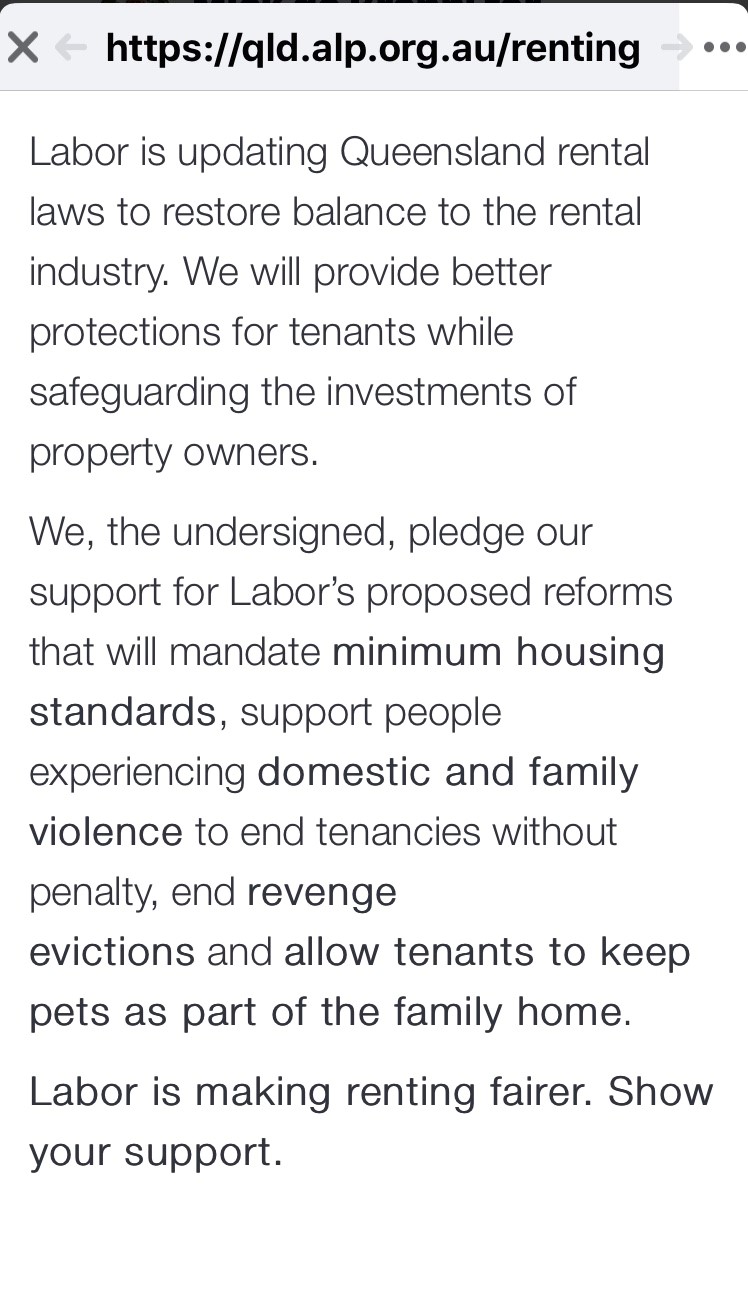
November 19 2019
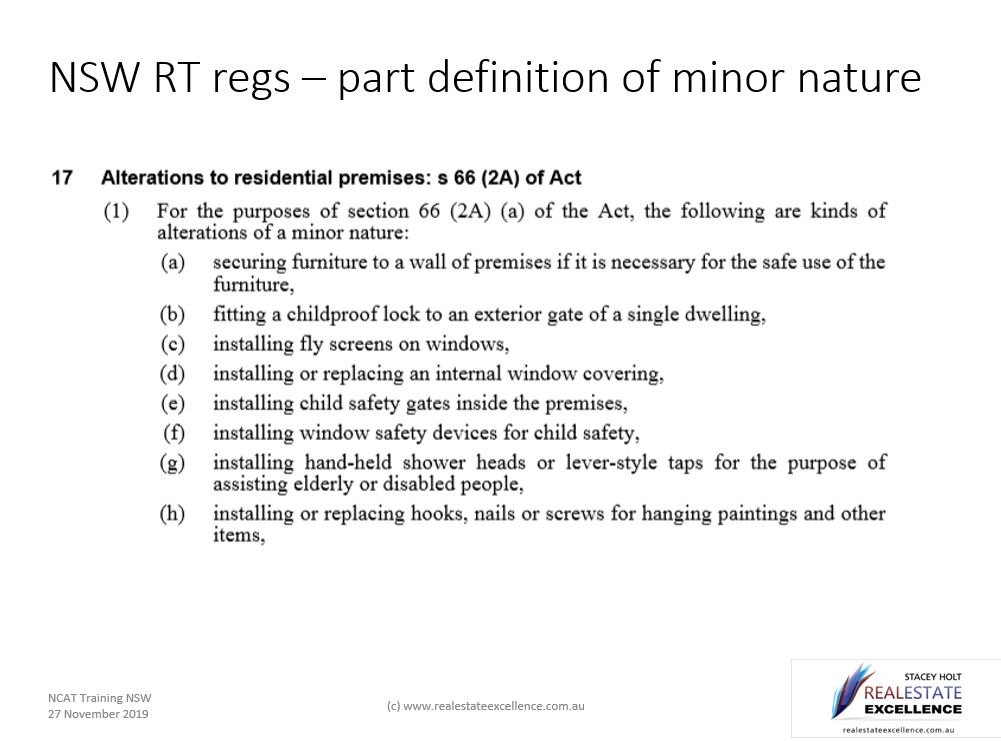
November 19 2019
Now is not the time to be negative. Cool heads must prevail. Since the release of stage one of the RTRA Act review (the consultation stage), many people are expressing outrage, and rightfully so, at the Queensland Labor Government regarding the proposed removal of an investor right to end a tenancy without grounds. The Government have used negative, emotive, unfair and unjust words often in relation to this matter. It is, and never was eviction, or evicting people without reason. It is ending a tenancy without grounds, termination of a contract, the end. There is a big difference.
Since the introduction of QCAT and published decisions and appeals in December 1, 2009, I have searched and saved every known tenancy case published. According to my records of almost ten years (QCAT is ten years old on 1 December 2019), there have been three matters published relating to retaliatory terminations/evictions. A reminder for Real Estate Excellence member offices that every known QCAT case published is at Member Online, folder 30 PME.
Cool heads again must prevail. Whilst the review is over, and we are at the consulting stage, it is not too late. I encourage all of industry now to inform their clients and use every means possible to inform people on what is being proposed. Whilst the Government statistics state 135 000 responses were received, the finer detail of that must be considered. 2% of responses were from agents. The review was carried out in many ways, including booths in shopping centres, social media and ‘pop up stalls’. I was, and still am very critical of the way the review was carried out as noted in my date order running blog.
You are welcome to use my submission to send to Government as part of the consulting stage. Please email me, or copy/paste, make any of your own edits from my blog. We have until December 28, 2019 to have our say. My submission can be found further on this blog (date November 17 2019), or here. The next stage is the draft legislation.
November 18 2019
The RTA are not carrying out the review as such; The Department of Housing are carrying out the review. Whilst the RTA is part of this Department, they are not conducting the review process.
Email received from Department of Housing and Public Works 3.15pm below.
|
Help shape Queensland's tenancy laws A review of Queensland’s tenancy laws is underway to ensure the rental needs of Queenslanders are met now and in the future. With more Queenslanders renting, and renting for longer, it is important that tenancy laws support individuals and families to find a safe, secure and sustainable place to call home. These laws also need to protect the investments of property owners, who provide much needed housing for an increasing number of Queenslanders. More than 135,000 responses were received during last year's Open Doors to Renting Reform consultation. We heard that Queenslanders want to feel safe and secure in the rental market, either as a tenant enjoying the property as their own home, or as an owner protecting the property as their investment. While a common set of renting issues were identified as important for all stakeholders, views about how Queensland’s tenancy laws should address these issues were diverse. Our Reform Roadmap outlines our response to the consultation findings and sets out a two-stage approach to a better renting future for Queensland. We’ve developed a Consultation Regulatory Impact Statement to seek feedback on options to change Queensland’s tenancy laws, including any potential impacts. There are five priority areas that you can provide feedback on:
Your feedback on the Consultation Regulatory Impact Statement will inform future policy decisions made by the Government to ensure we get tenancy law reforms right. Submissions can be made online or by post. The consultation is open for six weeks and all submissions must be received by 5pm AEST, 28 December 2019.
|
||||||
|
November 17 2019
The Consultation Regulatory Impact statement released on the 16th November 2019 (below) proposes the removal of the without grounds provision from the RTRA Act. Read more, and suggestions on what investors and industry can do now, click here. Listen to podcast on this matter here.
November 17 2019
The Consultation Regulatory Impact statement released on the 16th November 2019 (below) proposes the right of tenants to make minor alterations to a rental property. Read more, and suggestions on what investors and industry can do now, click here. Listen to podcast on this matter here.
November 16 2019 - Stage 1 of RTRA Act review released
Listen to a podcast regarding the RTRA Act review stage one here.
The Queensland Government have released the first stage proposed consultation report to the RTRA Act. As noted below, the review and future changes are proposed to be carried out in two stages.
Members of Real Estate Excellence; More information will be provided to members Monday 18th November via email as part of the "as it happens member update' service. Members will be provided with fact sheets, quick guides and more. A new folder at Member Online has been created called RTRA Act review stage 1.
Media Statements JOINT STATEMENT
Deputy Premier, Treasurer and Minister for Aboriginal and Torres Strait Islander Partnerships
The Honourable Jackie Trad
Minister for Housing and Public Works, Minister for Digital Technology and Minister for Sport
The Honourable Mick de Brenni
Saturday, November 16, 2019
Renting reform provides roadmap to save lives and curb domestic violence
The Palaszczuk Government has announced its plans to ensure safety and fairness in the Queensland rental market, after a huge response to community consultation.
Minister for Housing and Public Works Mick de Brenni said the response to consultation had been massive.
“It’s a sign of how strongly the community feels about renting that we’ve seen over 135,000 responses to our request for feedback through Open Doors to Renting Reform,” Minister de Brenni said.
“Through that process, we’ve identified three key areas for reform:
- Safety and security;
- Protection against domestic violence; and
- Protections if renting with pets
“We have considered evidence of some truly harrowing stories of safety issues in rental properties.”
Deputy Premier, Treasurer and Member for South Brisbane Jackie Trad said that the Palaszczuk Government was looking at a comprehensive makeover of tenancy laws that will set the rules that provide certainty for tenants, landlords and property managers.
“Across Queensland, more than one in every three households rent, but in some areas like the inner city, that figure rises to three in every five,” Ms Trad said.
“Tenants in my community and across Queensland are entitled to feel safe in their home, regardless of whether they own or rent.
“At the same time, we know that rental property owners need safeguards to protect their investment that provides much needed housing for an increasing number of Queenslanders.”
Minister de Brenni said the experience of Lyn and Ken Diefenbach who have advocated for prescribed minimum housing standards after the tragic death of their granddaughter Bella, was a driving factor for reforms to Queensland’s legislation.
“No parent should have to lose their child,” Minister de Brenni said.
“Regardless of where you live, every Queenslander deserves a safe, secure and sustainable place to call home.
“The Palaszczuk Government will deliver lifesaving reforms that see minimum standards adhered to, that keep Queenslanders safe, healthy and happy in their homes.”
Mr de Brenni announced that the Palaszczuk Government was releasing a roadmap detailing its staged approach to ensure that the proposed laws are fair for everyone.
The Palaszczuk Government will be seeking input into a Regulatory Impact Statement over the next 6 weeks.
Go to: www.qld.gov.au/rentinginqld to read the Better Renting Future Reform Roadmap to have your say on the proposed reforms.
ENDS
Media contact:
Deputy Premier’s Office: Geoff Breusch 0417 272 875
Minister de Brenni’s Office: Rosie Gilbert 0466 834 330
The above sourced from statements.qld.gov.au 16th November 2019
The below information has been sourced from qld.gov.au/rentinginqld. Stage 1 has been released as part of a Consultation Regulatory Impact Statement. The 5 key areas of reform are noted below and are detailed in the Consultation Regulatory Impact Statement. Stage 2 is expected to be released later in 2020. The proposed legislative amendment bill is the next part of the process to come.
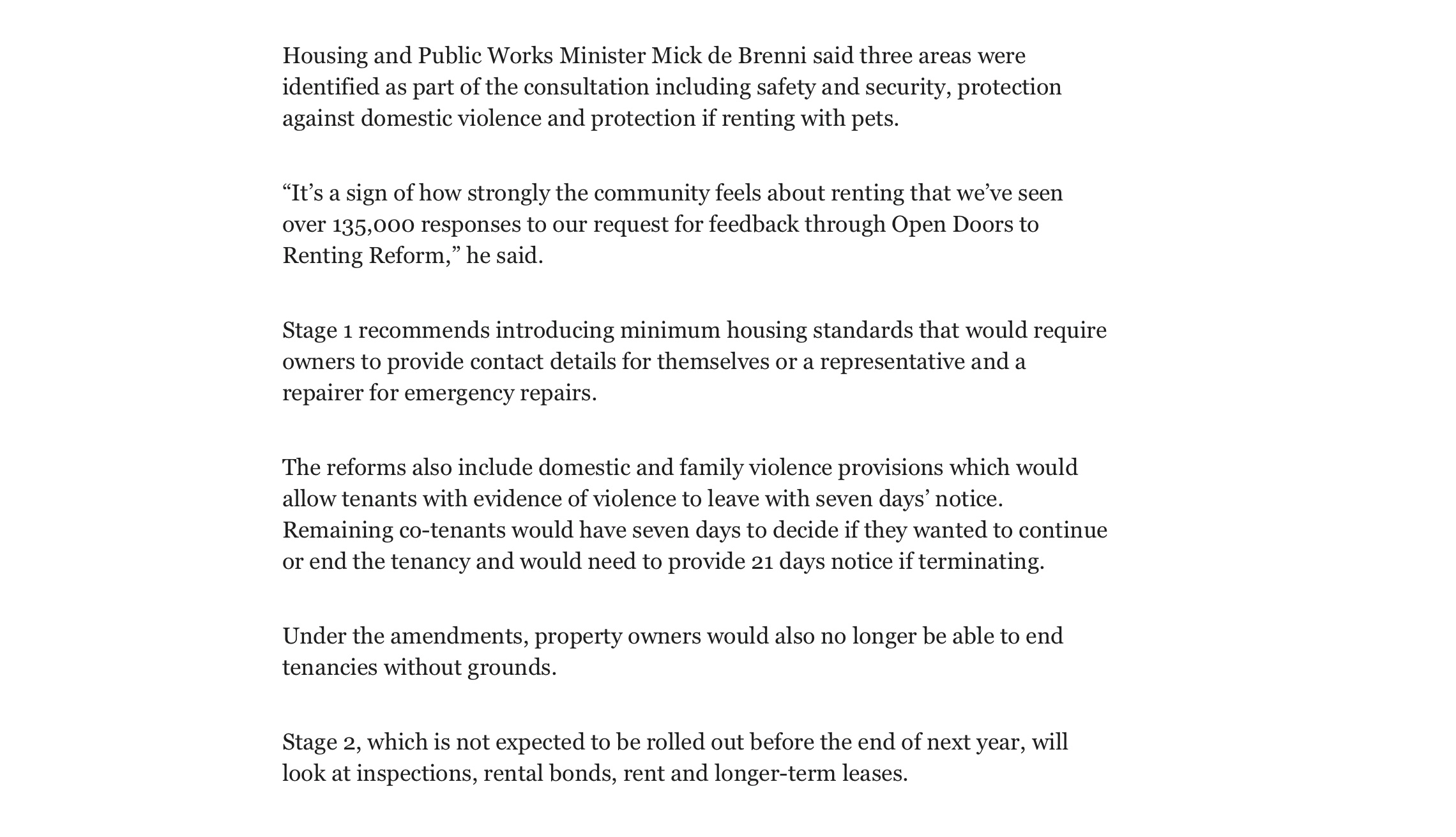
The above has been sourced from www.couriermail.com.au 16th November 2019.
April 12 2019
An update regarding the review has been posted in the Private Real Estate Excellence members group after I had discussions with Housing and Policy people.Real Estate Excellence member offices FB group Queensland member office private group here
All members will receive the review update with the May member update email service. Members who are not on social media, and would like an update before the May service, please email to receive. Contact us here.
April 2 2019
Click here to listen to Podcast by Stacey Holt regarding minimum housing standards.
March 20 2019
Click here to review a short video update regarding the review
March 7 2019
Email sent to our Bundaberg, Gladstone and Townsville mailling list regarding the solar panel rebate trial. Read useful information at the link below
Solar for Rental trial - Link HERE
March 5 2019
The Honourable Dr Anthony Lynham - Minister for Energy and Resources
Solar option on the table for tenants and owners
Up to 1000 landlords and their tenants have the chance to team up and cut power bills and emissions under a trial scheme in Bundaberg, Townsville and Gladstone.
Speaking from Bundaberg, Energy Minister Dr Anthony Lynham said the State Government was trialling rebates of up to $3500 to encourage rental property owners and their tenants to go solar.
“A typical household could save between $400 and $500 even after a $10 per week rent increase,” he said.
Under the scheme, tenants and owners must agree to having rooftop solar installed. The owner receives a rebate of up to $3500 to install solar and any rent increase must be fair and reasonable and agreed by both parties.
“This trial is all about giving tenants the opportunity to save on their power bills and their carbon emissions similar to the other 500,000 Queenslanders who are enjoying the benefits of solar,” Dr Lynham said.
“Queensland has one of the highest solar penetration rates in the world, with solar rooftop panels on one in three households.
“This trial is to encourage more renters and landlords to work together in reducing energy consumption through sharing the value of installing solar systems.
“Most importantly, the government rebate will only be available if the tenant and property owner have agreed to a fair rent increase, offset with power bill savings.”
Tenants Queensland chief executive officer Penny Carr said it was important that solar should not be confined to just those who own their home.
“Solar in rental properties is commonly overlooked by Queensland’s landlords, so it’s fantastic to see the Queensland Government helping tenants access the benefits of solar,” Ms Carr said.
“I encourage both landlords or tenants that are interested in lowering their living expenses and breaking into the solar market to get involved.”
The trial will run in Bundaberg, Gladstone and Townsville until June 30, 2020, or when the $4 million funding has been allocated.
“This trial is another chapter in our Affordable Energy Plan which continues to place downward pressure on electricity prices and this time we are focussing on tenants,” Dr Lynham said.
“We have worked with industry and stakeholders including Tenants Queensland and the Real Estate Institute of Queensland to establish this trial.
“If owners and tenants take up the challenge, this will also help expand our growing renewable energy sector which continues to create jobs and drive economic growth.”
To be eligible to apply for the Solar for Rentals trial:
- The property must be a house, townhouse or duplex located in Bundaberg, Gladstone or Townsville.
- The house must have its own roof space and it must be rented for less than $350 a week.
- Landlords and tenants must also both agree to a fair increase in rent and sign a new 12 month lease agreement.
For more information visit www.qld.gov.au/community/cost-of-living-support/concessions/energy-concessions/solar-for-rentals-trial/
[ENDS]
Media contact: Jan Martin 0439 341 314
7th January 2019 - Podcast regarding the review Click here to review podcast and link to listen anytime
17th January 2019 - The Government released a survey (email sent below regarding the survey regarding the review).
|
How can we improve our community consultations? The Queensland Government's Open Doors to Renting Reform community consultation was held over nine weeks from 30 September to 30 November 2018. We asked Queenslanders to share their renting experiences and ideas on how to improve renting in Queensland. Thank you for taking the time to have your say during the consultation. Input from the Queensland community was significant with more than 130,000 responses received - but we want to keep improving our community consultations. You can help us by completing a short survey and sharing with us how you heard about the Open Doors to Renting Reform consultation, what worked for you and what didn't. An independent research agency, Kantar Public, has been commissioned to undertake this survey on behalf of the Queensland Government. The survey will take about 10 minutes to complete. The survey is now open and will be available to complete until 5pm on Friday 25 January 2019. To begin the survey, please click on the link below: Take the Open Doors to Renting Reform evaluation survey (or copy and paste the link into your browser) https://ss.ktrmr.com/mrIWeb/mrIWeb.dll?i.project=Cvkpn&s=GEN24&id=1&chk=na&aar=1&pid=auto&rs=1 Information provided in the survey will be treated confidentially and if released, survey findings will not contain information that can be used to identify individual respondents. This market research is carried out in accordance with the Information Privacy Act 2009 (Qld). Thank you for taking the time to complete this survey. We appreciate your feedback.
|
||||||||
|
Join the conversation |
||||||||
| You have been sent this email because you participated in the Open Doors to Renting Reform consultation and indicated that you would be willing to be recontacted. The information collected will only be used for the survey described above conducted by Kantar Public Australia. The survey is being carried out in compliance with the Information Privacy Act 2009 (Qld) and your responses will be kept strictly confidential. Kantar Public is an international market research company and is a member of the Association of Market and Social Research Organisations (AMSRO) and Australian Market and Social Research Society (AMSRS). Kantar Public abides to the professional standards including AMSRS Code of Professional Behaviour and EOWA Guidelines. For more information about the organisation, please visit: http://www.kantar.com/public/ |
7th December 2018 - Queensland Government media release Housing Minister re the RTRA Act review
Minister for Housing and Public Works, Minister for Digital Technology and Minister for Sport - The Honourable Mick de Brenni Thursday, December 6 2018
Victorians’ vote on rental reform a good guide for Queensland. Click here to review Victorian reforms
After a 9-week consultation into the current rental laws in Queensland, the Palaszczuk Government has received a record breaking 130,000 responses from Queenslanders wanting to see change.
Minister for Housing and Public Works Mick de Brenni said the consultation reflected a national trend in the need for greater housing affordability.
“This is the first time the Queensland State Government has delivered a consultation on this scale. It has completely surpassed our expectations and I expect that this is down to the fact that housing security is a huge issue for Queenslanders,” Mr de Brenni said.
“We’re reaching a crisis point for housing in Australia, where most people are locked out of home ownership.
“The Palaszczuk Government promised before the election to conduct a review into rental standards and introduce minimum standards into rental properties to make sure that all Queenslanders could have a safe, secure and sustainable place to call home.
“What this consultation has done is help us identify the issues and potential solutions to give Queensland rental households real rental security whilst protecting property owners investment.”
“We are still counting some of the last mailed surveys, but as of yesterday there were 19,961 responses to the online survey, 13,508 postcard survey responses, 456 written submissions and 96,651 responses to our quick polls,” he said.
“We are listening to what everyone has to say so we ensure the system is fair for everyone.”
Mr de Brenni said the consultation had asked for sentiment about a range of issues, including security of tenure, no grounds evictions, minimum standards and accommodation for family pets.
“The Andrews Government asked the same sort of hard hitting questions of voters with regards to rental reform at their most recent election.”
“Clearly we need to look closely at what sort of reforms the Andrews Government enacted.”
“I’ve spoken to the new Victorian Minister for Housing Richard Wynne who reckons their election platform consisting of strong rental reforms played a massive factor in their 6% swing at the last election.”
Mr de Brenni said that currently 34 per cent of Queensland households are rentals, and with more and more Australians being priced out of the housing market this number was set to increase.
“If your home isn’t sorted, its pretty difficult to think about anything else,” he said.
“Labor understands that in 2018 renting is not a short-term solution, and we need to ensure all levels of government are working towards making housing more accessible.”
Mr de Brenni said the silence from the Commonwealth Government on the issue of housing affordability had been deafening.
“The Abbott-Turnbull-almost Dutton-Morrison Government has been too busy trying to avoid another leadership spill to focus on what really matters.
“What we really need is a federal government who is going to take this seriously. It’s not ok that last year more Australian’s bought their seventh home than their first.”
Mr de Brenni said the consultation was a successful first step in the review of the Residential Tenancies and Rooming Accommodation Act 2008.
“The next step is to analyse all the feedback and data collected throughout the consultation,” he said.
“Department of Housing and Public Works staff are already working with the Residential Tenancies Authority to analyse the many thousands of online surveys, written submissions, snap poll results and discussion forum comments.
“We will then identify priorities for reform and I’ll be providing regular updates about the process in coming months.”
The renting consultation ran from the 30th of September to 30th November 2018.
Key findings of the Queensland consultation found -
- Of those surveyed 50% of people thought the rules were swayed in the property owners favour, 24.3% thought they were weighted in the tenants favour, 18.2% thought the rules were balanced and 7% said they didn’t know.
- 12.3% of people thought the condition of their rental property was poor, 50.3% thought it was good and 37.3% thought they were excellent.
- Many tenants are seeking transfer their bond from one property to another, while property owners reported that bonds were often insufficient if tenants were behind in rent or did not take responsibility for damage.
- Tenants claimed nothing was flagged in their quarterly inspections but were then losing their bond when they moved out.
- Many tenants had asked for application forms to be standardised and simplified, and many tenants felt it was an invasion of privacy to be asked for bank statements in addition to pay slips when applying for a property.
- Tenants also reported paying between an additional 60 cents up to $5 each time they paid their rent in processing fees.
- Respondents also said there needs to be clearer expectations around fair wear and tear and cleaning requirements at the end of leases.
- On the issue of pets, many tenants said they found it difficult to find a rental property that accepted pets.
- Making minor changes to a property also created a lot of discussion. Tenants would like to be able to make their house feel more like a home by hanging pictures and safer by fixing furniture to walls.
- We heard that property owners would like to have a say on what changes can be made to their properties and ensure modifications are installed correctly and safely. They also want to be able to ask for the property to be returned to its original condition if the tenant leaves.
Final blog statement With the Ministers tweet and media release this morning I shared, it’s game over.
All we can do is hope for the best and remember, it will work out and we will deal with it.
6th December 2018 - Review still accepting written submissions. Watch short 4 minute video here. It has come to my attention by accident (reviewing the Government website), that they are still accepting submissions in writing until 21st December 2018. Details below.
6th December 2018 - A personal thought
I hardly had anything left in me after this painful ridiculous 9 week tenancy law review in Queensland.
After devoting almost 25 years of my professional and personal life to this industry, overnight I found the strength I need to give some more.
The review is still taking submissions which I found out by accident on the Government website. Thanks for letting us know when you asked for all our emails.
The flawed choice report has me seething.
We must continue to have our say. Please email This email address is being protected from spambots. You need JavaScript enabled to view it. any thoughts before 21 December.
I’ve contacted channel 7,9,10 and ABC this morning.
The Government and media are only reporting one side. This is totally not balanced, unfair.
Stacey Holt
5th December 2018 - Choice "disrupted' National report. Choice and tenant organisations have released a report which is concerning. What are called repairs may not be repairs, therefore, I find the statistics false and misleading, plus, 1067 people were surveyed in Australia only.
29th November 2018 - RTA submission - Tenants claiming bond prior to end of tenancy Review here
22nd November 2018 – Submission by Real Estate Excellence - Tenancy application forms should not be regulated by Government
"Theme five" of the RTRA Act review has just been released (looking and leasing) and I must write and express my utmost concern regarding applications relating to tenancy.
Application for tenancy forms have not been regulated by Government for good reason; these documents are a risk management and best practice document for the lessor client investor. The document should not ask unlawful questions as per the Anti-Discrimination and other relevant laws. There is continuous education and awareness given to property managers about these serious matters of discrimination, plus a duty of an employer under other legislation to ensure compliance.
Tenancy rental applications are written for best practice and risk management to gauge two main factors when assessing suitability of the tenant for the investment property;
Tenant ability to pay the rent
Tenant ability to care for the property.
The tenants evidence dependant on their past situations prior to applying are verified, and then assessed as to their suitability based on best practice procedures and the lessor investor client decision as to whether they accept the tenant's application. Tenancy applications could also be written in part due to landlord insurance requirements.
Government should not meddle into agency/ lessor risk management and best practice, and as per my opening paragraph, I am concerned that this is a possibility being entertained and hope this is not considered as part of any future legislation.
- What information do property managers and owners need to make an informed decision about a prospective tenant?
- What information do tenants think is reasonable to provide when applying for a rental property?
- Should the application process be more regulated, such as through standard application forms or which identify/limit what information prospective tenants can be asked for?
Yours sincerely
Sent via email This email address is being protected from spambots. You need JavaScript enabled to view it.
Stacey Holt Company Director Real Estate Excellence Academy Pty Ltd
The Palaszczuk government is consulting with landlords and the rental property industry across the state to assess the residential tenancy laws. The process is set to be completed by the end of November.
Some of the issues to be discussed include pet ownership and how it could be made easier for landlords and tenants to agree on households keeping pets, according to Mick de Brenni, minister for housing and public works.
However, Grant Mifsud, a professional partner at Archers the Strata, pointed out that the issue, together with other home alterations such as permitting property occupants to change window coverings, are often decided by a body corporate committee and their strata scheme’s by-laws.
“Bodies corporates are like a fourth layer of government, except it’s the unit owners and not public servants who make up the committee and make the majority of decisions,” Mifsud said. “These decisions deal with situations that affect people’s living arrangements. As a tenant or owner within a strata property, it’s important to be aware of the things you can and can’t do in your strata scheme.” Full article here.
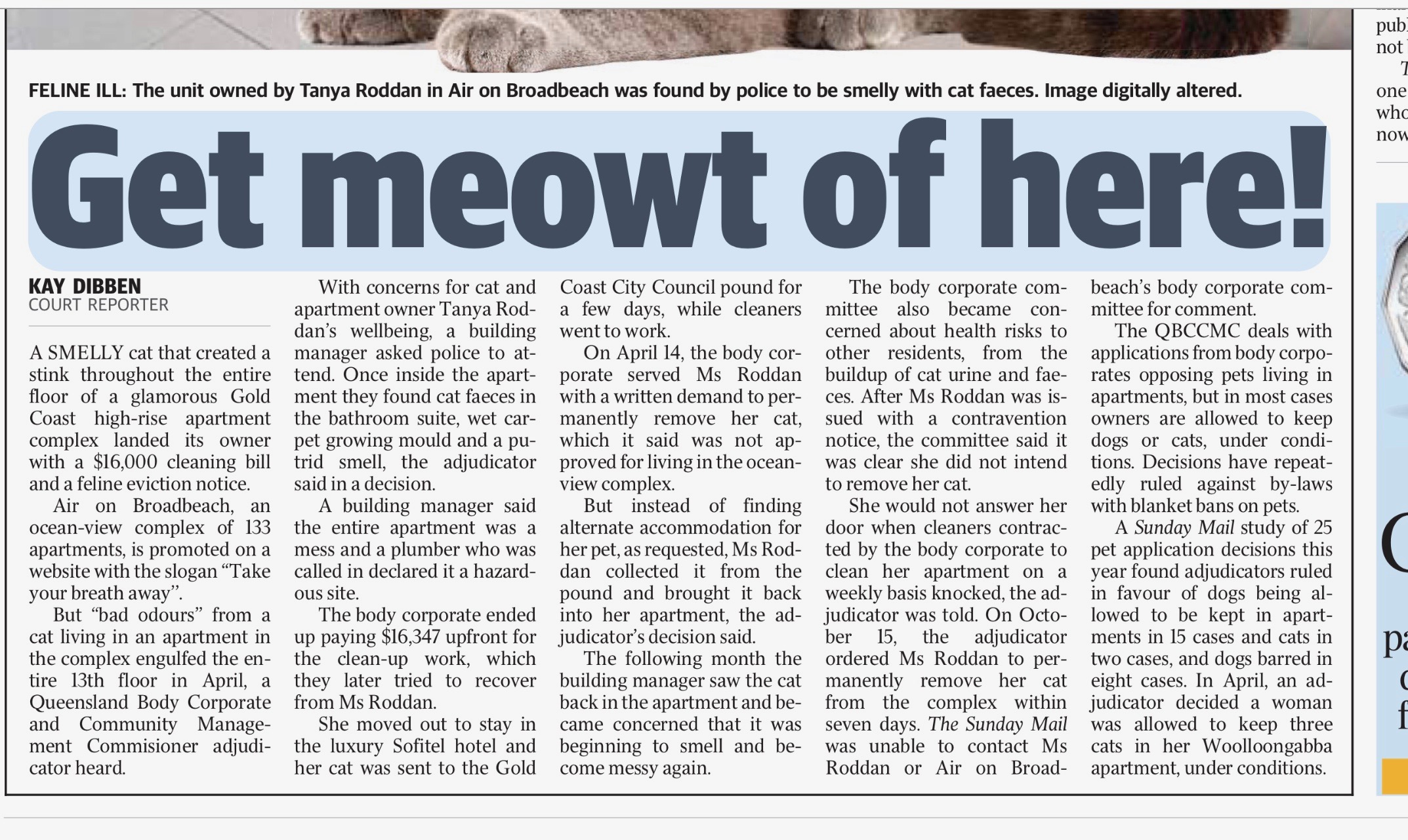
This submission is written in response to the Government ‘snap poll question’ and forum discussion question regarding domestic and or family violence and tenants on a fixed term tenancy. Tenants on a periodic tenancy are currently protected by giving two weeks’ notice to end the tenancy, therefore no change is needed.
“How can we help people experiencing domestic and family violence to end their tenancy obligations without penalty if required?”
The snap poll question alludes to evidence being produced to end a tenancy in lieu of a tribunal order and the current situation. I believe this may mean possibly providing a Queensland Police interim domestic family violence protection order or a domestic and or family violence court order.
Most likely it is predicted that a new ground for the tenant to end a tenancy will be in the future RTRA Act. With respect, given the tragic societal and community issue of family and domestic violence is growing, plus the move by other states in relevant tenancy legislation regarding domestic violence, some consideration should be given as part of the RTRA Act for the lessor in relation to a reasonable notice period such as 14 days to assist in the lessor losses and or expenses which most likely will be incurred due to the early end of a fixed term tenancy.
The tenant currently can end a fixed term tenancy at any time by giving 14 days’ notice as per the provisions in current sections 331 (3) and 327 (2) which results in a breach of agreement due to ending an agreement early. In a future submission, I will be providing information regarding the current imbalance of rights between the parties (lessor and tenant) regarding this provision and the needs to make the ‘rules fairer for both parties’ and create more equality. Consideration strongly needs to be given in relation to ensuring both parties are protected; the tenant emotionally, financially and physically, and the lessor financially.
Should this new ground allowing fixed term tenancy agreements end by the tenant proceed in the RTRA Act future amendments, 14 days’ notice to end a tenancy with enough lawful evidence such as noted in paragraph 2 above (Queensland Police interim domestic family violence protection order or a domestic and or family violence court order) should be in place. If the tenant is on a periodic agreement, the status quo should remain as per section 331 (f); 2 weeks’ notice to end a fixed term tenancy.
Yours sincerely
Sent via email This email address is being protected from spambots. You need JavaScript enabled to view it.
Stacey Holt
Company Director
Real Estate Excellence Academy Pty Ltd
Media Statements
 |
 |
|
Minister for Housing and Public Works, Minister for Digital Technology and Minister for Sport The Honourable Mick de Brenni
|
Palaszczuk Government commits dollars and cents for ‘Dollars and Sense’
Minister for Housing and Public Works, Minister for Digital Technology and Minister for Sport The Honourable Mick de Brenni
Wednesday, November 14, 2018
Palaszczuk Government commits dollars and cents for ‘Dollars and Sense’
The Palaszczuk Government has announced a tenancy skills training package that will help around 17,000 Queenslanders struggling to secure a home in the state's tightening private rental market.
In the middle of consultation on historic reform to renting laws, Minister for Housing and Public Works Mick de Brenni today announced the $8.2 million Skillsets for Successful Tenancies – Dollars and Sense Program, which will be rolled out across the state.
“Mum and dad investors are playing a crucial role in Queensland, helping the rental market meet increasing demand for homes in our towns and cities,” Mr de Brenni said.
“But the competition for private rental homes, unfortunately, can marginalise vulnerable young people leaving home for the first time and other at-risk groups in our community.
“This programme funds free training designed to help people successfully find and maintain a private rental property. It certifies that people are skilled to rent and take care of a property.
“It's one less thing for investors to worry about if they know they are handing the keys to their investment to people who are qualified to manage a private tenancy.
“From our Open Doors to Renting Reform consultation, we know that renters and property owners have more in common than they’ve been given credit for.
“Both property owners and renters want housing stability, their house to be well looked after and simply to feel secure.
“This certification will show that tenants have the skills required to take on the financial responsibility of a tenancy, and know about their rights and responsibilities when it comes to maintaining a property.”
The commitment follows successful trials earlier this year in Ipswich, Logan and Toowoomba, which have seen many graduates access or sustain private market tenancies.
Helping vulnerable Queenslanders access and sustain private rental tenancies and create a better future for themselves through education and training are key aims of the Queensland Housing Strategy 2017–2027 ( https://www.qld.gov.au/housing/public-community-housing/have-your-say-housing-strategy ).
The program will be delivered by inCommunity Inc., a specialist community housing provider with an established and proven competency-based tenancy skills training package.
Chief Executive Officer Paul Tommasini said graduates of the programme could be considered ‘tenants of choice’ for the real estate industry.
“They will have proven competency in the skillsets identified by property managers and agents – this will give our graduates a competitive advantage when applying for properties,” he said.
“The training is practical and engaging and takes about 10 hours to deliver per student group.
“This training will give potential tenants a real chance to secure a home even in areas with low vacancy and high demand,” he said.
Partnerships with local real estate agents proved a crucial ingredient in the success of the program trials.
Real Estate Institute of Queensland Chief Executive Officer Antonia Mercorella described tenancy skills training as an essential element in Queensland's rental reform process.
“Tenancy training helps protect the rights and responsibilities of tenants and landlords in Queensland, keeps our stock of rental properties in better condition for longer and has the potential to reduce disputes,” she said.
“The REIQ welcomes this initiative that supports the more vulnerable members of our community in their goals to rent property, and which also gives landlords some peace of mind when handing over the keys to their investment.”
If the QLD Government are serious about a more balanced and fair tenancy Act, I believe they should consider this.
This comment based on the security element of the review discussion. Currently lessors have to give two months notice to end a tenancy but can’t end the tenancy before the lease end date unless the tenant agrees.
To be balanced and fair for all parties, consideration should be given for changing the future law so tenants have to give more than 2 weeks notice.
Current laws for termination without grounds (without reason).
Lessor 2 months, with end date of notice not allowed to be earlier than end date of lease (fixed term) & no change required. Periodic lease also 2 months
Tenant 2 weeks notice “anytime” as per sections 331 (3) and 327 (2).
Email sent to our "FREE Mailing list"
Yesterday, as part of the RTRA Act review, the Government released a new ‘discussion’ – flexibility and security. Many of us (including me) are getting what I call review fatigue… this is drawn out and we need to keep motivated, particularly with this matter. I have made six submissions in total thus far; without grounds is covered at my running blog here 23rd October (date reference to scroll down too). Please like my Facebook page Make renting fair for all parties in Queensland which is another way to keep up to date.
As I have been advising since the Act went under review on 30th September, anyone and everyone has until 30th November to ‘have their say”. I hope you have been advising your lessor of the review and encouraging them to have their say as they are going to be the most impacted. Member offices of Real Estate Excellence; we emailed you two templates last week for your final edit to use as part of your education and awareness strategy. Below is the new ‘snap poll question.
NOTE
This question from QLD Government should say at end of tenancy...#rentinginqld
It’s being misunderstood as some people think question is should the Lessor have the right to end the tenancy “anytime” as opposed to the intent of the question which I believe to be “ at the end of tenancy”
Link for POLL (as above to have your vote and possibly share with your clients) https://www.yoursayhpw.engagementhq.com/rentalsecurity?tool=quick_poll#tool_tab
Link for information about the review and what has occurred so far https://www.yoursayhpw.engagementhq.com/about-renting-in-qld
Link to my running blog that covers the review history and all relevant matters from 2012 RTRA Act review
Minister for Housing and Public Works, Minister for Digital Technology and Minister for Sport
The Honourable Mick de Brenni
Monday, November 05, 2018
Safety issues topping the list as renting survey shifts focus
More than 97 per cent of people who have taken part in the Palaszczuk Government’s Open Doors to Renting Reform consultation are indicating that the structural condition and safety of their properties is a top concern, Housing and Public Works Minister Mick de Brenni said today (Monday).
Mr de Brenni said the survey revealed an alarming percentage of respondents pointing to safety repairs to their properties, including the plumbing and pest infestation as the most important issues to be addressed when it came to minimum standards.
He said the responses were among 40,000 so far received.
“This consultation is about uncovering new opportunities to strike a better balance between a property owner’s house and a tenant’s home, so it’s important that everyone gets to have their say about how to improve renting in Queensland,” Mr de Brenni said.
“So far Queenslanders have said overwhelmingly they want good tenants who want to stay and care for their property, and that this is good for landlords. “But we’ve seen respondents to the online survey comment that they had been given notice to leave ‘without grounds’, in many cases suggesting it is connected to repairs or maintenance issues.
“There could be many reasons for winding up a lease, such as the owner or one of their family members needing to move into the house, the home being listed for sale or needing to undergo significant renovations.
“However, we have also heard stories from tenants where they have been told to leave without any reasonable grounds, but then see the property back on the market just weeks later.”
One such respondent was Mary, who had been renting a property north of Brisbane for three-and-a-half years when she was suddenly “without grounds told she had to find a new place to call home”.
The single mother of four children, who wanted to stay in her home, tried to negotiate with her real estate agent to renew the lease – without success.
"I wrote a letter to the real estate agent asking to stay but I was told the owner wanted me out and my lease would not be renewed,” she said.
She had to quit her job as she was unable to juggle commuting into the city for work, attending house inspections to find a new property, and moving out. She found an available rental property – further away from her children’s schools – and her application was accepted. Mary’s home was back on the market within weeks, with a higher rent.
Mr de Brenni said Mary’s story was not unique. “There are simply too many replies to the Open Doors to Renting Reform consultation having shared similar stories about their experiences renting in Queensland,” he said.
He encouraged property owners, property managers and tenants to get online and take part in the Open Doors to Renting Reform consultation before the 30th November.
The Open Doors to Renting Reform consultation program aims to ensure better protections for tenants and property owners, as well as increased stability in the rental market. The consultation runs until 30 November 2018, featuring a range of activities including pop-up kiosks at markets and shopping centres where people can share their views and experience of renting in Queensland. The Palaszczuk Government is now interested in hearing views from property owners, property managers and tenants on tenancy flexibility versus security.
The website, survey and information on consultation events can be found at: www.yoursayhpw.engagementhq.com/RentingInQLDThe online survey can be found at www.getinvolved.qld.gov.au, or you can email This email address is being protected from spambots. You need JavaScript enabled to view it. or share your thoughts on social media using the hashtag #rentinginqld
Minimum Housing standards, safety of rental property and Minister statements - Real Estate Excellence 5th submission to Government as part of RTRA Act review. Complete submission at member online for member offices to review. The following is part of the submission emailed today to Government.
Further comments to submission from page 3 submitted 22nd October considering Minister media statements October 28th, 2018.
The Queensland Housing Minister, the State Government and all parties in the sector need to remember that section 214 RTRA Act (definition of emergency repairs) includes if a property is unsafe and or has a fault likely to injure a person. Lessor obligations are covered in section 185; and if the lessor is not taking the right action to repair their property, tenants have many rights to enforce the law. There is no need for more legislation as the matter of safety is covered as mentioned above and is in my submissions to Government as part of the 201 and 2014 reviews. The Government should consider the Parliamentary committee recommendation in 2014 and make section 191 a penalty unit provision to assist with enforcement if it is needed. Tenants also could take enforcement action via the magistrate’s court (if order made by Tribunal. They could also act under section 94 (rent reduction) and compensation under section 419 (breach of agreement).
An immediate legislative fix to this matter is penalty units introduced for section 191. I urge the Queensland Government to review the Parliamentary Committee report of 2014 before proceeding. Quotes from page 13 of the above-mentioned report above.
“The Committee has noted that while there is general acknowledgement of the need for safe rental housing, there is little support for minimum housing standards being mandated in the Residential Tenancies and Rooming Accommodation Act 2008. The majority of submitters were of the view that the proposed minimum housing standards would unnecessarily duplicate existing building and health and safety standards and could lead to increased costs and red tape, adversely impacting on the availability and affordability of housing.
The Committee has been advised that the Minister is currently undertaking a review of the Residential Tenancies and Rooming Accommodation Act 2008 and the Committee is of the view that the Minister should assess the need for minimum housing standards to be mandated in the Act, in the context of the current broader review of the legislation.
While submitters made some valid points about ongoing repair and maintenance issues, there appears to be avenues for addressing these issues through existing legislation and standards which can be enforced by local councils and other agencies.
The Committee notes that the Minister for Housing and Public Works is currently considering a proposal to introduce an offence if a lessor does not to comply with a Tribunal order for repairs and/or maintenance and is of the view that this would provide tenants with an efficient and effective method of dealing with lessors who do not act on an order."
"Generally, the proposed options were not supported and it was noted that the main issue was around getting repairs done in a small number of cases where landlords failed to act. As a result, the RTA has proposed that the Act be amended to "introduce an offence for a lessor not to comply with a Tribunal order for repairs and/or maintenance and 40 penalty units are attached. This would be a continuing offence.… The Minister for Housing and Public Works, the Honourable Tim Mander MP, is considering the recommendations to amend the RTRA Act."
29th October 2018
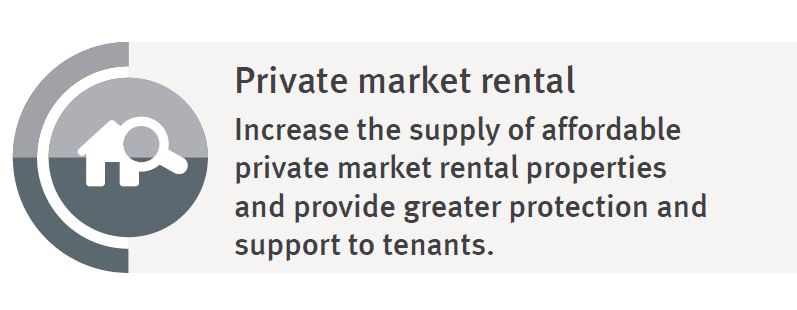
This submission is written in response to one of Tenant Queensland ‘7 point plan’ relating to regulating rent increases.
Rental amounts and rent increases should not be regulated by Governments. Pricing of real estate is governed by supply and demand, not CPI, not governments. Whilst focus is on making the property a home for tenants, and rightfully so, the property is an investment for an investor. Lessors are investors; not social housing providers.
Tenants are well protected in current legislation for rent increases during a tenancy or during a periodic tenancy (section 92) and from one fixed term tenancy to another (section 71).
Considering capping rent increases should not be considered as part of a Government role and regulation.
Yours sincerely
Sent via email This email address is being protected from spambots. You need JavaScript enabled to view it.
Stacey Holt
Company Director
Real Estate Excellence Academy Pty Ltd
I’m perplexed and a little concerned about this question from Government as part of the RTRA Act review ... are they possibly indicating lessors provide solar panels the future?
How could energy and water efficiency of rental properties be improved? What would encourage energy and water efficiency features to be included in rental properties, like solar panels or water saving devices? www.qld.gov.au/rentinginqld
In 2010, a terrible tragedy occurred as discussed today (article sourced from Courier Mail subscriber account). When the coronial inquest report was handed down (September 2012), the RTRA Act then went under review. Due to reasons discussed in my blog as outlined below, the review of the RTRA Act has been ongoing in some form for all these years. Read the coronial inquest report and findings here.The Queensland Government today have released a new 'snap poll question' - and is focusing on property condition currently in the review. Details here
Minister for Housing and Public Works, Minister for Digital Technology and Minister for Sport The Honourable Mick de Brenni.
Sunday, October 28, 2018
Minimum standards for rental properties to honour baby Bella
The grandparents of a baby girl killed in a tragic accident at a Central Queensland rental property today (Sunday) supported the Palaszczuk Government’s commitment to residential tenancy reform - which they hope will prevent “future tragedies”.
Lyn and Ken Diefenbach have been advocating for prescribed minimum standards for rental properties since the death of their seven-week-old granddaughter Isabella in 2010. Their son was holding baby Bella when a rotten floorboard gave way on the deck of their rental property, and his daughter tragically fell from his arms.
Mrs Diefenbach said Isabella’s death had been “cataclysmic” for the family.
“It’s an ongoing thing, and I don’t think for any family who suffers any trauma, it ever goes away. And it could have been avoided, and it was certainly seen as a preventable incident”.
Mr Diefenbach said he hoped the government’s Open Doors to Renting Reform consultation on property conditions, including minimum standards, would prevent future tragedies – and encouraged all Queenslanders to have their say.
“We want Bella’s death to count for something and we’re pleased there’s now an opportunity for this and other issues to be addressed,” he said. “What we would like is that if anything is identified in a rental property that is not safe, that the tenants are notified as well as the property owner.
“And some sort of regulatory body that’s got teeth so that if nothing is done about it, there are consequences for the property owner and for the agency that’s handling and managing the property.”
Housing Minister Mick de Brenni – who meet with the Diefenbachs in Brisbane earlier this month – said prescribed minimum standards in rental properties would ensure Queenslanders never “felt like they had to live in a dangerous home”.“Queenslanders deserve to know that basic living and safety standards are met in their homes, whether or not they rent it or own it. The Palaszczuk Government is determined to deliver outcomes – and a legacy for baby Bella, and that is why it is so important we hear directly from families like the Diefenbachs.“At the time of this tragedy, the Coroner handed down recommendations that compelled reform to ensure a tragedy like this never happens again.”Member for Keppel Brittany Lauga, who organised the Brisbane meeting between the Diefenbachs and Mr de Brenni, said all Queenslanders deserved a safe, secure and sustainable home.“The sad circumstances surrounding Bella’s family is just one tragic example of why these laws need reforming, and why protection needs to be stepped up,” Mrs Lauga said.“Queensland has one of the highest proportions of people renting in Australia, and many will rent for part or all of their lives. This government wants Queenslanders to have contemporary residential tenancy laws that protect tenants and property owners alike.”The Open Doors to Renting Reform consultation program, which runs until November 30 2018, is being conducted by the Department of Housing and Public Works in conjunction with the Residential Tenancies Authority (RTA) and aims to ensure the Residential Tenancies and Rooming Accommodation Act 2008 provides better protections for tenants and property owners and increases stability in the rental market.The website, survey and information on consultation events can be found at: www.qld.gov.au/rentinginqld ( http://www.qld.gov.au/rentinginqld ) or you can email This email address is being protected from spambots. You need JavaScript enabled to view it. or share your thoughts on social media using the hashtag #rentinginqldMedia StatementsMinister for Housing and Public Works, Minister for Digital Technology and Minister for Sport The Honourable Mick de Brenni.
Sunday, October 28, 2018
More than 35,000 Queenslanders have their say on Palaszczuk Government rental reform
Minister for Housing and Public Works Mick de Brenni today (Sunday) helped doorknock homes in his Springwood electorate as part of the Palaszczuk Government’s consultation into the future of renting in Queensland.Mr de Brenni said Logan residents were confirming the results of the government’s statewide Open Doors to Renting Reform survey – tenants want a fairer system that helps improve their lives.“We are determined to deliver outcomes because renting affects almost everyone in Queensland in some way – whether they rent, own or manage a rental property, or know someone who does,” Mr de Brenni said.“This consultation is about striking the right balance between a property owner’s house and a tenant’s home, so it’s important that everyone gets to have their say. Apart from doorknocking homes, we’ve held consultation sessions at the Logan Homelessness Connect event, Springwood Mobile Library and the Logan Hyperdome.“And Logan residents are raising concerns being expressed in the wider Open Doors to Renting Reform survey."Across Queensland, more than 35,000 responses have been received in the first 24 days of the state-wide consultation. The issue of pets is proving a hot topic, with an online poll showing 51 per cent of respondents feel renters should be allowed to have a pet without needing to ask permission.“People also want more certainty about their lease, problems fixed up in a timely fashion and minimum standards for properties. They are worried their rent can be increased too often, they want better protections, fewer inspections and rewards for good tenants, and are concerned about tenants’ rights around evictions.”One of properties doorknocked today was the Rochedale South unit rented by Andrew Paul, who has lived there with his wife and two daughters for nearly four years.Mr Paul welcomed the Palaszczuk Government’s consultation program.“While my experience has been good since moving down from Mackay, I think it’s important that everyone works together when it comes to renting – tenants, property owners, real estate agents and the government – the communication has to be continually open,” Mr Paul said.“I’ve got no paintings up in our house because I don’t want to put hooks in, and then be up for the cost of having to patch-up the walls if we ever had to move. But on the other hand, I also understand the risks being taken by landlords who are putting tenants into their investment properties,” he said.The Open Doors to Renting Reform consultation program runs until November 30, 2018 and is being conducted by the Department of Housing and Public Works in conjunction with the Residential Tenancies Authority (RTA). It aims to ensure the Residential Tenancies and Rooming Accommodation Act 2008 provides better protections for tenants and property owners and increases stability in the rental market.The website, survey and information on consultation events can be found at: www.qld.gov.au/rentinginqld ( http://www.qld.gov.au/rentinginqld ) or you can email This email address is being protected from spambots. You need JavaScript enabled to view it. or share your thoughts on social media using the hashtag #rentinginqld
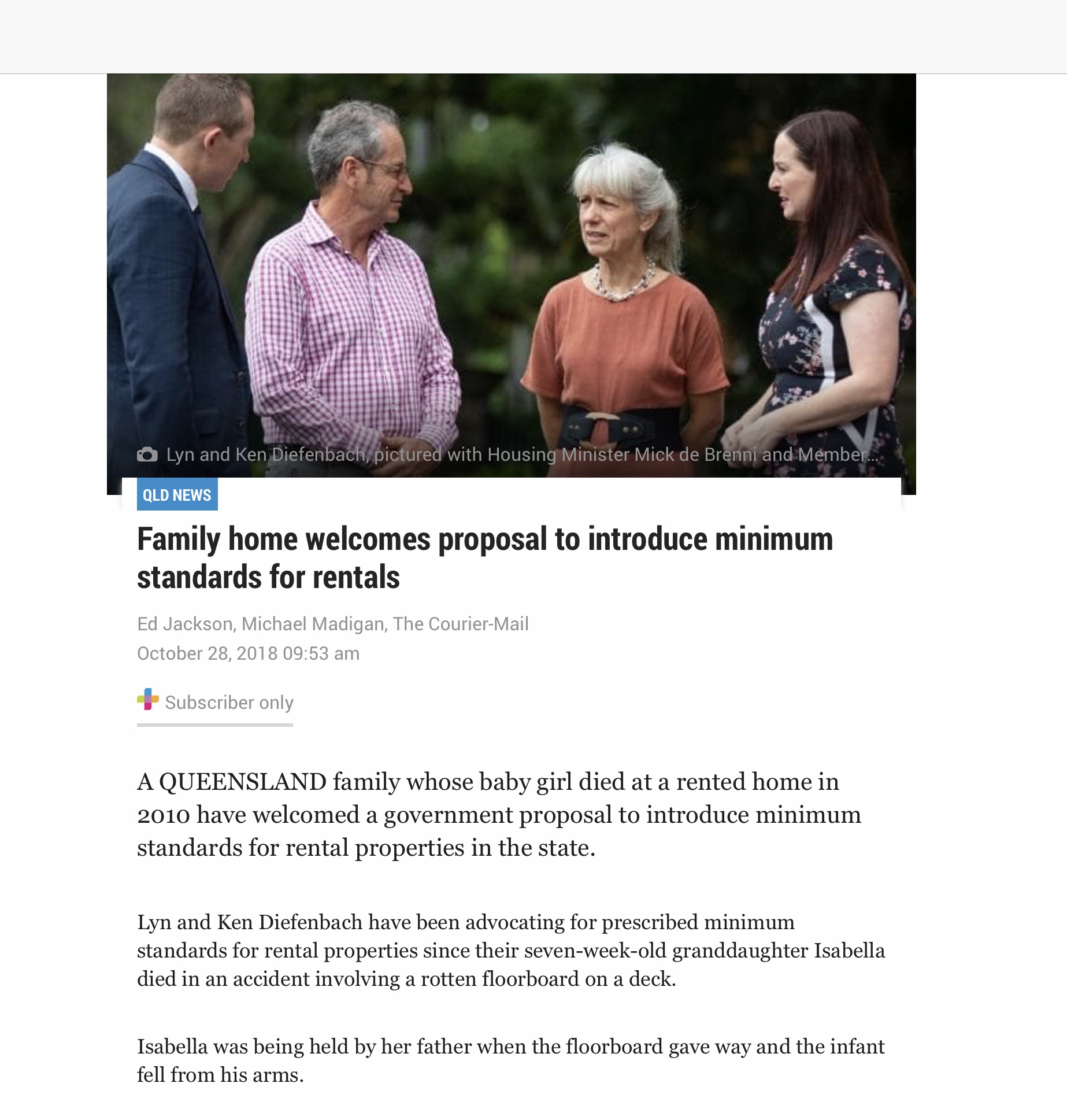
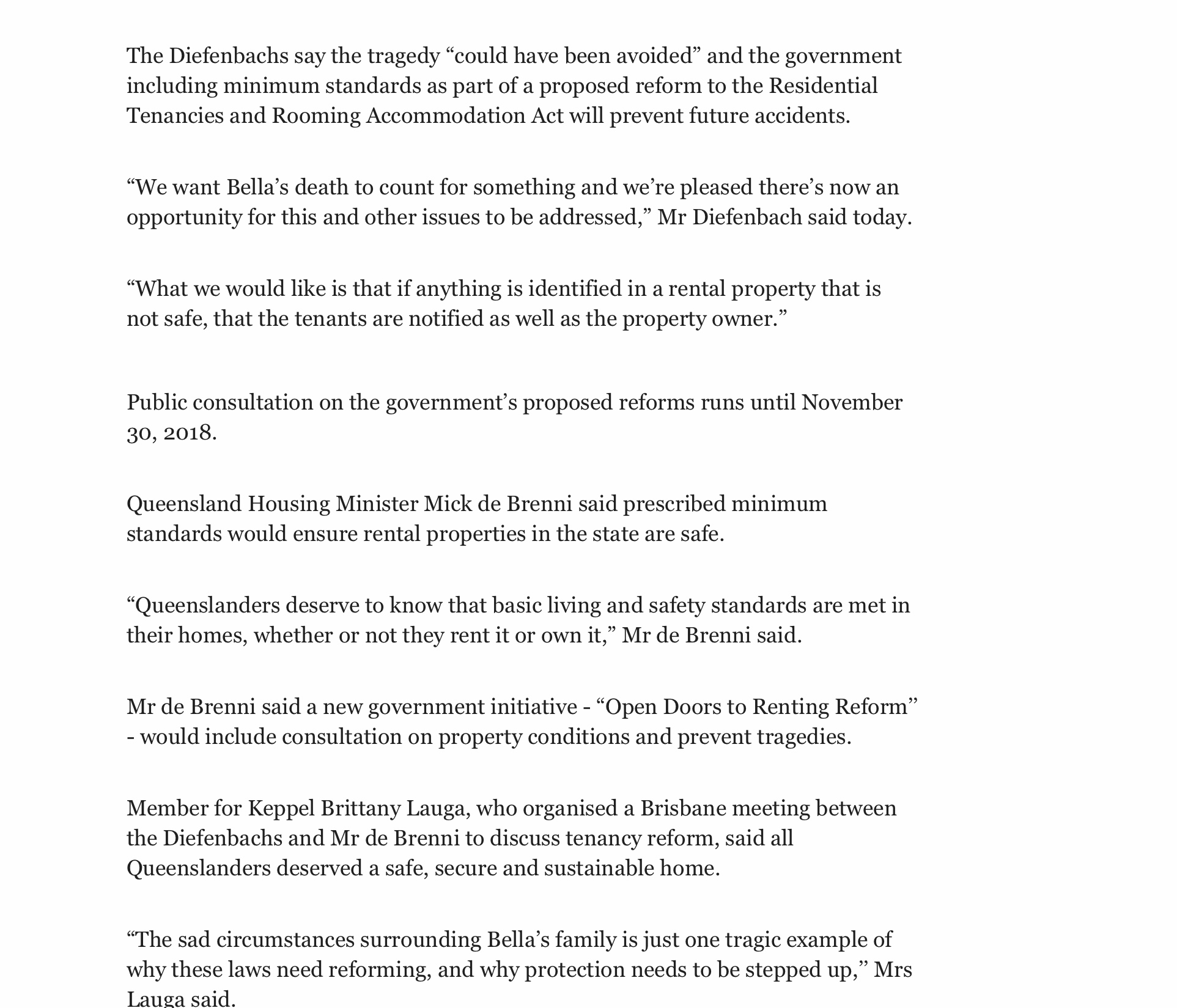
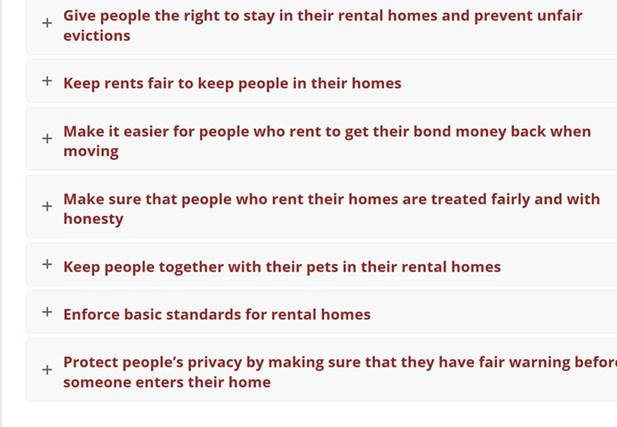
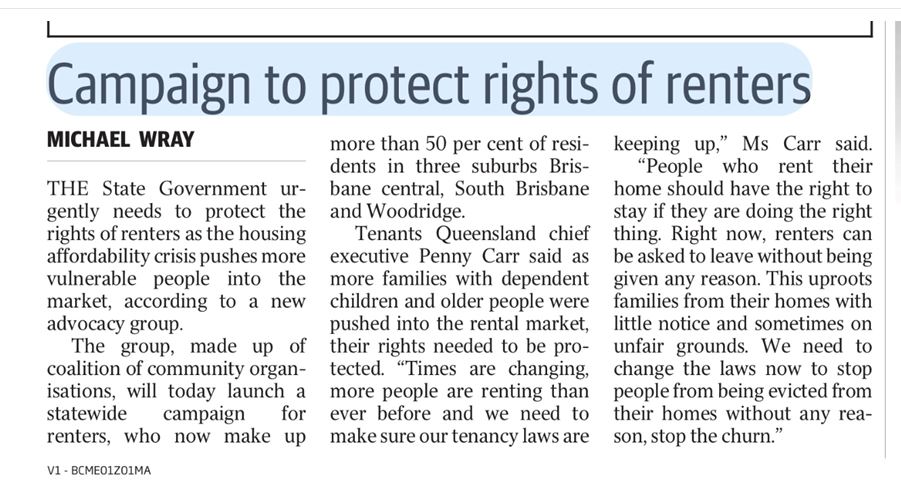
- What do you think are acceptable standards for the condition of rental properties?
- What standards of safety should Queensland rental properties be required to meet?
- What should happen if minimum standards are not met?
- How would minimum standards for rental accommodation impact you as a tenant, owner or manager?
- What do you think are acceptable standards for the condition of rental properties?
- What standards of safety should Queensland rental properties be required to meet?
- What should happen if minimum standards are not met?
- How would minimum standards for rental accommodation impact you as a tenant, owner or manager?
- What does ‘clean’, ‘fit to live in’ and ‘in good repair’ for rental properties mean for you?
- How could managing the ongoing repair and maintenance of rental properties be improved?
- How can we improve the way in which damage caused to a Queensland rental property is dealt with?
- What does ‘clean’, ‘fit to live in’ and ‘in good repair’ for rental properties mean for you?
- How could managing the ongoing repair and maintenance of rental properties be improved?
- How can we improve the way in which damage caused to a Queensland rental property is dealt with?
- How could energy and water efficiency of rental properties be improved?
- What would encourage energy and water efficiency features to be included in rental properties, like solar panels or water saving devices?
- How could energy and water efficiency of rental properties be improved?
- What would encourage energy and water efficiency features to be included in rental properties, like solar panels or water saving devices?
- How can housing design and safety measures be improved in the rental market?
- What reasonable modifications should tenants be allowed to make for safety reasons?
- How can housing design and safety measures be improved in the rental market?
- What reasonable modifications should tenants be allowed to make for safety reasons?


8th October 2018
Real Estate Excellence submission to Government regardings pets, tenants making changes to the property and entry is available at member online for member offices.
4th October 2018
Why legislation does not need to change regarding tenants making alterations to a property.
A reference to the requirements when tenants wish to make any changes to the property is currently covered in standard term 27 of the lease / tenancy contract agreement (Form 18a). The relevant sections of the RTRA Act are as follows. Landlord should retain the right to know what changes are being made to their property, and their consent sought. Tenants may drill holes, place excessive amounts of hooks in property that may aesthetically change the property, and or damage the property in the process. Tenants are protected if a lessor is unreasonable in any written requests. As the Minister in his tweet below reference, planting of flowers are innocent enough, but creation of gardens can create dispute in the future when the current tenants chose to move to another home, and the new tenants are faced with the possibility of gardens to maintain.
Keep the law as it. This is fair for all parties.
207 Attaching fixtures and making structural changes
The tenant may attach a fixture, or make a structural change, to the premises only if the lessor agrees to the fixture’s attachment or structural change.
208 Agreement about fixtures and structural changes
(1) The lessor’s agreement to the attaching of a fixture, or making of a structural change, must—
(a) be in writing; and
(b) describe the nature of the fixture or change; and
(c) include any terms of the agreement.
(2) For an agreement about attaching a fixture to premises, the terms may include terms about—
(a) whether the tenant may remove the fixture; and
(b) if removal by the tenant is allowed—
(i) when and how the removal may be performed; and
(ii) the obligation of the tenant to repair any damage caused to the premises in the removal or compensate the lessor for the lessor’s reasonable costs of repairing the damage; and
(c) if removal by the tenant is not allowed—the obligation of the lessor to compensate the tenant for any improvement the fixture makes to the premises.
(3) The lessor must not act unreasonably in failing to agree to the attaching of a fixture, or the making of a structural change, to the premises.
(4) If the lessor agrees to a fixture being attached, or a structural change being made, to the premises by the tenant, the tenant must not contravene a term of the agreement.
209 Attaching fixture or making structural change without lessor’s agreement
(1) If the tenant attaches a fixture, or makes a structural change, to the premises without the lessor’s agreement, the lessor may—
(a) waive the breach; and
(b) treat the fixture or change as an improvement to the premises for the lessor’s benefit.
(2) The lessor may take the action under subsection (1) instead of taking action for a breach of a term of the residential tenancy agreement by the tenant.
4th October 2018
Tweet from the Housing Minister of Queensland.
If you do not agree with the QLD housing minister, consider sending an email This email address is being protected from spambots. You need JavaScript enabled to view it. advising you don’t agree and why. It must be noted that section 185 RTRA Act states as part of Lessor obligations "if the premises include a common area—must keep the area clean" (part of section 185 currently). This would usually fall under Body Corporate obligations. Property managers do not clean or test anything. They manage tenancy. Plus, the review at this point is only '4 days old'.
If you do email the Government as above, I welcome you to cc me into the emails for my reference, your email would be confidential and for my business only. Thank you. Stacey Holt. This email address is being protected from spambots. You need JavaScript enabled to view it.
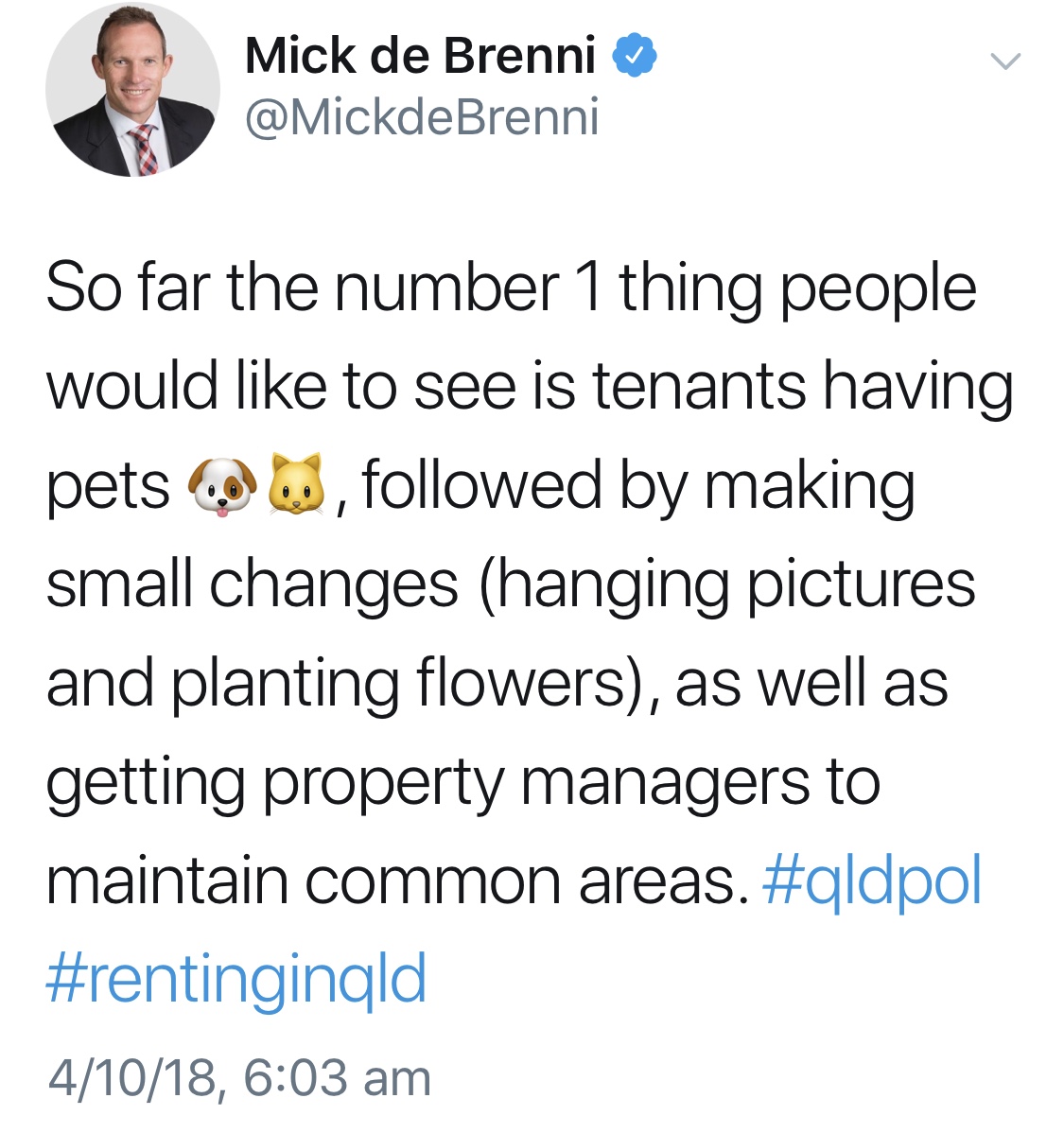
3rd October 2018
How the Queensland Government have thrown a whole sector into chaos
The Labor Government of Queensland announced late Sunday morning during a long weekend that state tenancy laws are under review. The strategy behind the review is unprecedented with stakeholders’ options to contribute to discussion group forums online, snap polls, questions of the week, pop up stalls. Where is the discussion paper? Are we going to drag out the review for two months using the questions of the week, flawed snap polls, pop up kiosks and sponsored ads on social media?
The snap poll system at https://www.yoursayhpw.engagementhq.com/about-renting-in-qld are flawed with ability to vote more than once. What is the point of such a system?
I assume after the two months (ending 30 November 2018), the Government will review and then release draft legislation for further consultation? Given these are unprecedented ways to conduct a review of critical legislation, this is also uncertain. This issue most likely will take some time, even years, but again, this is all uncertain with the way the review has been announced and is being conducted.
I wrote to the Government on Monday morning (part of email below) and have yet to receive a reply; yes, they have more important things to do then sit around waiting for my email and reply to it. But when the questions are urgent and legitimate, surely a public servant can take the time to address an industry concern. The way the review is being carried out, as mentioned above, is creating angst, uncertainty, anger, frustration and basically fear amongst the sector.
“With respect, after many years in Policy and being part of past reviews of the Act/s, I am a little perplexed by the new website and what is going to happen moving forward as part of the RTRA Act review.
As you would be aware, most consultations have a draft paper as part of review; is this going to occur? Regarding the options of having a say, is it going to be a ‘question of the week’ format with a poll, survey, group discussions and written submission based on a blank canvas?
The main question I have is there going to be a consultation paper to respond to or will it be just as above?
Thank you for your time and for understanding the urgency of these questions. We need certainty moving forward to ensure the review is balanced, understood and as many stakeholders as possible have an opportunity to have a meaningful say and provide the feedback needed to move forward to ensure the review is reasonable.”
Adding further to the confusion and uncertainty is the Residential Tenancies Authority (RTA) announcement www.rta.qld.gov.au (below) which includes the following statement; does this mean free for all based on blank canvas, or are these going to be the snap poll system, questions of the week etc.
This is your chance to comment on a wide range of topics related to renting, such as looking for a property, finding tenants, bond payments, rent payments and increases, renting with pets, requesting or organising maintenance and repairs, breaking leases and more.
Have your say on renting in Queensland
If you are a tenant, rental property owner or property manager, the Queensland Government is opening the door to renting reform, and invites you to share your ideas about renting in Queensland.
You can have your say by completing a short online survey or by visiting a community consultation event.
Your feedback will help inform a review of the Residential Tenancies and Rooming Accommodation Act 2008, and help shape the future of renting in Queensland, ensuring better protection for tenants and property owners.
The Open Doors to Renting Reform consultation is being undertaken by the Department of Housing and Public Works, together with the Residential Tenancies Authority (RTA).
This is your chance to comment on a wide range of topics related to renting, such as looking for a property, finding tenants, bond payments, rent payments and increases, renting with pets, requesting or organising maintenance and repairs, breaking leases and more.
The Queensland Government is casting the net wide to listen to the challenges and opportunities with renting, and understand the issues across the state throughout the ‘looking, leasing, living, leaving’ rental cycle.
Have your say about renting in Queensland by completing the online survey at www.qld.gov.au/rentinginqld or visit the website for information on community consultation booths.
Emotive tweets such as below from the Premier (Saturday evening 30 09 18) do not assist in a fair and reasonable discussion to ensure all parties wants are balanced and fair.
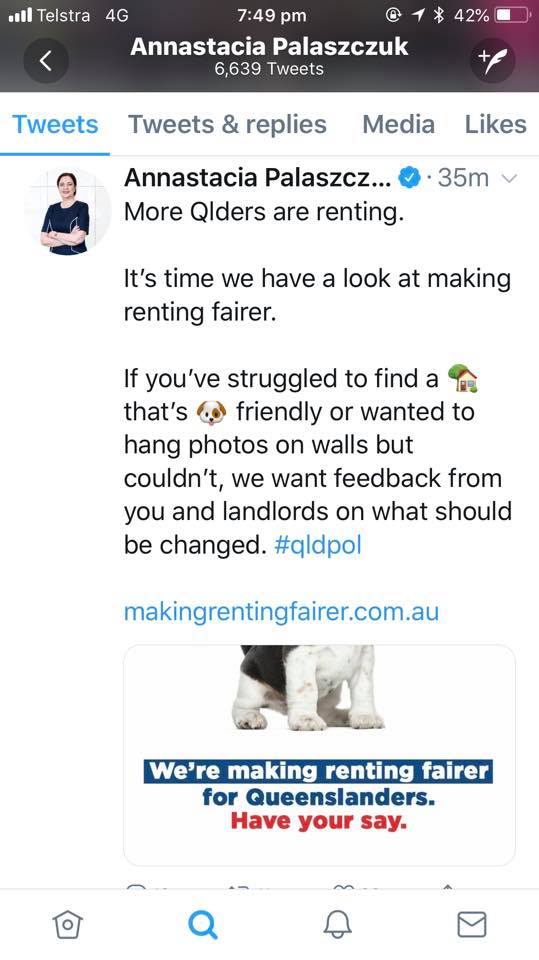
3rd October 2018
Why the without grounds provision for ending a tenancy should stay in tenancy legislation. Read more here
2nd October 2018
Suggestions on how to have your say
The Government have a 'new way' to seek feedback regarding the RTRA Act review (as per my email to them 1st October below). In lieu of a response to my email at the time of this blog, I have taken the assumption this is the way they are going to carry out the review for now. Therefore, moving forward, the ways feedback can be given by all stakeholders are as follows;
- Vote on their snap poll and visit their site often *weekly by the looks at the moment https://www.yoursayhpw.engagementhq.com/about-renting-in-qld
- Sign up and join their website https://www.yoursayhpw.engagementhq.com/about-renting-in-qld
- Join the discussion at the above website
- Attend at consultation event (information at their website)
- Write submissions and email to the email supplied on the website
- I have decided to write submissions and have chosen to take the questions from the discussion group forum at their website and make into a document. View the week one draft submission - Real Estate Excellence members, please contact me to review
- Keep an eye on my running blog here
Real Estate Excellence member offices - I will upload all submissions to the folder at Member online as shown below. I am going to write submissions each week during the review, then collate into one paper. You can visit member online anytime to review and provide any feedback to me which would be appreciated. I shall keep you informed via the member update service as well.
Stacey Holt
1st October 2018
I have written to the Government this morning as per below.
Good morning
My name is Stacey Holt and I represent over 250 member offices in Queensland, plus I am an educator, trainer and advisor for the Real Estate Industry www.realestateexcellence.com.au
With respect, after many years in Policy and being part of past reviews of the Act/s, I am a little perplexed by the new website and what is going to happen moving forward as part of the RTRA Act review.
As you would be aware, most consultations have a draft paper as part of review; is this going to occur? Regarding the options of having a say, is it going to be a ‘question of the week’ format with a poll, survey, group discussions and written submission based on a blank canvas?
The main question I have is there going to be a consultation paper to respond to or will it be just as above?
Thank you for your time and for understanding the urgency of these questions. We need certainty moving forward to ensure the review is balanced, understood and as many stakeholders as possible have an opportunity to have a meaningful say and provide the feedback needed to move forward to ensure the review is reasonable.
Stacey Holt
1st October 2018
Sourced from the Courier Mail 01 10 18
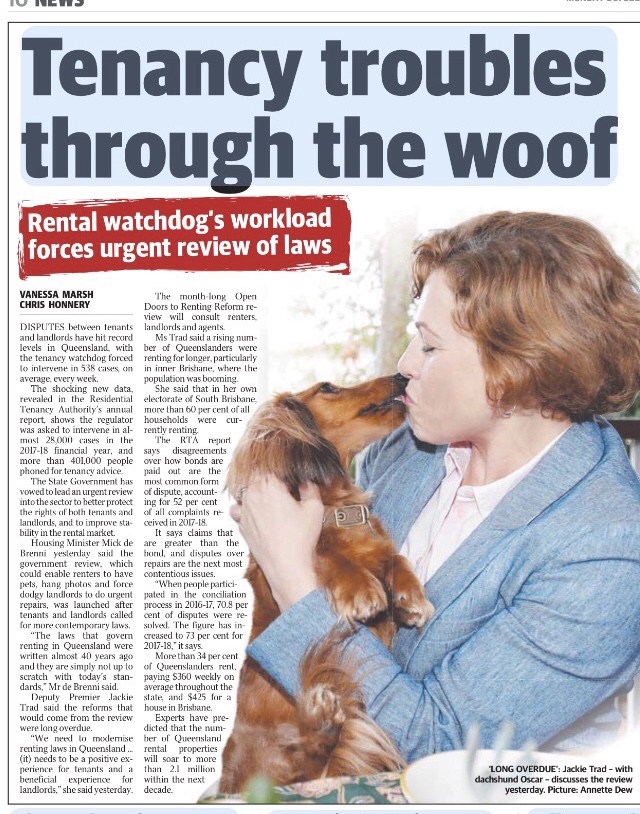
The QLD Government released the RTRA Act review information- 30th September
View "Open doors to rental reform" QLD Government website as part of RTRA Act review
Real Estate Excellence member offices; I shall review the consultation draft and advise you via the member update membership service.

30th September 2018 - the above article sourced from the Sunday Mail page 9
Short video update - view here
30th September 2018 - Government release sourced from statements.qld.gov.au 1pm
Media Statements
The Palaszczuk Government Opening the Doors to Renting Reform
Minister for Housing and Public Works, Minister for Digital Technology and Minister for Sport The Honourable Mick de Brenni.
Sunday, September 30, 2018
The Palaszczuk Government Opening the Doors to Renting Reform
The Queensland Government is undertaking a state-wide consultation in readiness for important reforms to residential tenancy laws for renters and property owners to ensure Queenslanders needs will be met now and into the future.
To start the process this week, renters, landlords and real estate agents will be contacted and asked for their views, how the market is changing and how well the system is working.
This is a key part of the Palaszczuk Governments ‘Open Doors to Renting Reform’ consultation process announced today.
Feedback will also be sought from landlords and the rental property industry in a bid to protect all involved and to improve housing stability for people living in the private market.
Premier Annastacia Palaszczuk said all Queenslanders deserve a safe, secure and sustainable home, and we know that many Queenslanders see investing in rental properties as a way of securing their financial future.
“My Government wants Queensland to have contemporary residential tenancy laws that protect tenants and property owners alike and improve stability in the rental market,” the Premier said.
“The last full-scale review and changes to the tenancy regulations dates back to 1970’s. It’s well and truly time for another now.
“Queensland has one of the highest proportions of people renting in Australia, and many will rent for part or all of their lives.
“Currently 34% of Queensland households are finding their homes in the rental market and many a renting for longer.
“In fact, 43% of tenants have been renting for over 10 years.”
42% of families rent in the private sector.
A national tenant survey released jointly in 2017 by CHOICE, National Shelter, and National Association of Tenant Organisations reported a range of concerns from tenants.
- 62% feel they can’t ask for change.
- 50% fear being blacklisted on a tenancy data base.
- 21% said they had waited more than 7 days for urgent repairs.
- 20% have had maintenance issues.
- 8% live in a home in need of urgent repairs.
Rental property owners have also expressed concern that when things go wrong, such as rent arrears or evicting tenants, it comes at a high cost, and rental bonds may not cover all expenses they incur at the end of a tenancy.
The average cost to replace a tenant at the end of a fixed term lease is $1800.
Minister for Housing and Public Works Mick de Brenni said we want to make sure those living in rental accommodation can enjoy a decent standard of living and that property owners have well managed properties.
“Over the next three months, I want the state-wide consultation to come up with answers as to how can people better enforce their rights and how can competing interests be managed better,” Mr de Brenni said
“Many tenants have raised with me that it is difficult to hang your kids school photos or paintings on the wall in rental properties.
“Australians have one of the highest rates of pet ownership in the world with 62 per cent of households keeping a pet, however only 10% of rental properties have pets living in them.
“How can we make it easier for landlords and tenants to agree on having a pet?
“How can we make it easier for tenants to add finishing touches to their home, without causing damage that would be costly for property owners? “
“Property owners have raised with me that they want to see regular inspections to properties and for repairs to be addressed more quickly to ensure their investments are protected”
“And while Tenancy legislation provides the framework and processes to follow, sometimes things go wrong.
“People may have to take further action, such as dispute resolution through the Residential Tenants Authority, or going to the Queensland Civil and Administrative Authority to get orders enforced.
“For both property owners and tenants , this can be time consuming and challenging and they may require further support.”
Deputy Premier and Member for South Brisbane Jackie Trad said the Government wanted to shape any reforms from the experiences of tenants and landlords alike.
“Here in my community of South Brisbane we have a particularly high proportion of renters, with over 61 per cent of households being rentals. Of those almost half of renters are in apartments,” Ms Trad said.
“I hear from my community all the time that these laws need reforming and that protections need to be stepped up.
“We want to hear from as many residents as possible about what they want to see changed.
“At the last election we committed to introducing minimum standards to rental properties and we know there’s more things to be done to help make renting fairer for everyone.”
The Open Doors to Renting Reform consultation program is being conducted by the Department of Housing and Public Works in conjunction with the Residential Tenancies Authority (RTA), and aims to ensure the Residential Tenancies and Rooming Accommodation Act 2008 provides better protections for tenants and property owners and increases stability in the rental market.
The consultation runs from 30 September until 30 November 2018, featuring a range of consultation activities including pop-up kiosks at markets and shopping centres where people can share their views and experience of renting in Queensland.
The website, survey and a discussion paper as well as information on the dates and locations of consultation events can be found at: www.yoursayhpw.engagementhq.com/rentinginqueensland (external site) ( http://www.yoursayhpw.engagementhq.com/rentinginqueensland )
The online survey can be found at www.qld.gov.au/rentinginqld ( http://www.qld.gov.au/rentinginqld ) or you can email This email address is being protected from spambots. You need JavaScript enabled to view it. ( mailto:This email address is being protected from spambots. You need JavaScript enabled to view it. ) or share your thoughts on social media using the hashtag #rentinginqld.
Media contact: Cat Milton 0447 117 132
23rd September 2018
The RTA have advised the RTRA Act will soon be going under review. Information was supplied to Real Estate Excellence member offices and our FREE mailing list last week. If you would like to receive updates to your email inbox, email This email address is being protected from spambots. You need JavaScript enabled to view it. and state your name, email and location (such as Mackay).
Section 185 of the RTRA Act was amended last year and was enacted (as per blog notes below) 10th November 2017; brand new section 17a (below) also came in to effect.
The proposed regulations, and what may be the minimum housing standard (s) for Queensland rental property are expected to be part of the Act review. All of Real Estate Excellence education and training events have advised attendees of the new laws and updates and will continue to do so.
Division 4 Prescribed minimum housing standards
17A Prescribed minimum housing standards
(1) A prescribed minimum housing standard means a standard prescribed by a regulation.
(2) A regulation may prescribe minimum housing standards for—
(a) a residential premises let, or to be let, under a residential tenancy agreement; or
(b) a rental premises; or
(c) inclusions for premises; or
(d) facilities in a moveable dwelling park (park facilities).
(3) A prescribed minimum housing standard may be for anymatter relating to the premises, inclusions or park facilities, including, for example, the following—
(a) sanitation, drainage, cleanliness and repair of the premises, inclusions or park facilities;
(b) ventilation and insulation;
(c) protection from damp and its effects;
(d) construction, condition, structures, safety and situation of the premises, inclusions or park facilities;
(e) the dimensions of rooms in the premises;
(f) privacy and security;
(g) provision of water supply, storage and sanitary facilities;
(h) laundry and cooking facilities;
(i) lighting;
(j) freedom from vermin infestation;
(k) energy efficiency.
[s 18]
(4) If a regulation made under subsection (2) makes provision in relation to a matter and provision is also made in relation to that matter by, or under, any Act, the regulation—
(a) if not inconsistent with the Act, must be observed in addition to that Act; and
(b) if inconsistent with the Act, is, to the extent of the inconsistency, of no force or effect and that Act prevails.
Example of inconsistency between a prescribed minimum housing standard and an Act—
A prescribed minimum housing standard, that purports to require a lessor to keep residential premises and inclusions clean after the start of a tenancy, is inconsistent with the obligations of a tenant under section 188(2).
(5) A regulation may also prescribe how compliance with minimum housing standards is to be monitored and enforced.
(6) In this section— premises means premises mentioned in subsection (2)(a) or (b).
Real Estate Excellence member offices - The November member update services provided important information regarding these new laws.
Real Estate Excellence members - Receive immediate updates by joining the Member office private Facebook group (QLD Real Estate Excellence member office staff only).
Reminder to member offices, new folder at member online.
Update 27th November 2017
A new version of the Property Management Excellence PME manual (part of the PME system) will be released January 30th 2018 to include information on the new laws (plus other improvements and edits).
From the RTA website www.rta.qld.gov.au
Update 31st October 2017
A 30 minute training webinar is now available explaining the new laws and the current situation. QLD PME system member offices can view the training online anytime as per the member email on the morning of 31st October. Non PME member office and non Real Estate Excellence offices can purchase the training for a small training service fee. Contact us.
Update 30th October 2017
The laws are yet to commence and have not received assent from the Governor.. With the election being called on 29 October, there will be some time until we no more about the commencement date of the law and the detail about the regulations.
The November Real Estate Excellence member update service has important information for member offices.
Update 26th October 2017
New laws passed last night in allowing for minimum housing standard regulations. More information will be provided to Real Estate Excellence member offices via email in near future and immediate updates provided in the Facebook private members group;
Direct link for members https://www.facebook.com/groups/QldRealEstateExcellencemembersgroup/
Non members can find more information at www.parliament.qld.gov.au and refer to Hansard 25th October 2017.
Media Statements
Tim Nicholls – Minister for Slumlords
Media Statements
Minister for Housing and Public Works and Minister for Sport
The Honourable Mick de Brenni.
Wednesday, October 25, 2017
Tim Nicholls – Minister for Slumlords
This evening, the LNP united to vote against laws that will ensure rental properties are safe and fit for purpose.
Minister for Housing and Public Works Mick de Brenni said the LNP’s position was disgraceful, and demonstrated how out of touch Tim Nicholls is.
“Every Queenslander has the right to know that the home they live in is safe, secure, and fit to live in,” Mr de Brenni said.
“Just over a third of Queenslanders live in rented accommodation, including many families raising children.
“You can’t sell a car in this state without having it checked over and a roadworthy certificate issued, and the reason for that is simple – you should be confident that when you buy a car, it’s in good working order and safe to drive.
“Most Queenslanders spend a lot more time in their homes than they do in their cars, and yet Tim Nicholls would rather let slumlords rent out houses with rotted floorboards or windows which don’t close properly than stand up for Queensland renters.
“Tim Nicholls has decided he’s the Minister for Slumlords - he should hang his head in shame.”
Mr de Brenni said the amendment, which was passed this evening without LNP support, would set clear benchmarks for landlords and tenants.
“It was only a week ago that the Local Government Association of Queensland passed a motion, calling on the Queensland Government to mandate enforceable standards for rental properties,” Mr de Brenni said.
“Tim Nicholls is ignoring his party’s own Mayors, in favour of dodgy landlords who put Queensland families at risk.
“It’s just not good enough.”
[ENDS]
Media contact: Tristan Douglas 0447 164 197
- Click here to review the Parliamentary Committee report - refer from page 35 onwards
- Click here to view Townsville Local Government motion
- Click here to view Channel 7 media regarding Townsville council views
Update 13th October 4.30pm - After writing to the LNP Opposition Leader, Mr Nichols (refer to notes below), I received a call from his office late this afternoon. The LNP will not be supporting the proposed minimum housing standards currently before QLD Parliament. Refer to page 75 of the following committee report. It will depend on the crossbenches of the QLD Parliament see who they are here as to how they vote. I will be contacting the cross bench in coming days to obtain their policy view and will update accordingly.
Update 10th October 2017 - Qld Parliament is sitting over the next three days. The RTRA Act proposed minimum housing standard laws are number 5 on the current Government agenda. www.parliament.qld.gov.au
Update 12th October 2017 - An email has been sent to Member offices of Real Estate Excellence advising of current situation. Click here to review
Update 13th October 2017 - The bill was not heard and is currently number 2 on the Governent agenda for when they next sit on the 24th October.
I have written to Tim Nichols, the leader of the QLD LNP - email below. I shall advise of the response in due course.
Good morning Mr Nichols, Leader of the LNP Queensland
My name is Stacey Holt and I have a company called Real Estate Excellence (www.realestateexcellence.com.au)
My company focus is on best practice, compliance and risk management services for the QLD and NSW real estate industry.
The reason for my email is to request LNP policy, if available, relating to future rental laws.
As you are aware, the HOUSING LEGISLATION (BUILDING BETTER FUTURES) AMENDMENT BILL is before the Parliament now relating to minimum housing standards. You most likely are also aware of the Green’s policy relating to rental laws https://greens.org.au/qld
Given an election is looming, I am keen to advise my clients and the real estate industry of the LNP policy relating to rental laws in Queensland.
Stacey Holt.
10th August 2017
On the 10th August, the industry was advised by Real Estate Excellence via our mailing list service and via social media, a bill has been introduced into Queensland Parliament to amend the RTRA Act and introduce minimum housing standards. A further email was sent and social media posts were made on the 19th August regarding the opportunity to have your say about the proposed amendments. (refer to the bottom of this blog post).
An email template to send to landlords prior to August 28th encouraging submissions is available to member offices of Real Estate Excellence. Members, please email us to receive.
Minimum housing standards for Queensland rental property was first proposed in 2014 and submissions were then called. Click here to read Real Estate Excellence submission from 2014. The submission that will be made in relation to the current amendment, will be very similar to the 2014 submission. Scroll down to review the 2017 submission from Real Estate Excellence.
The committee that reviewed the minimum standards proposal in 2014 advised the Government to not introduce the laws. Read the committee report here.
The Government have stated they wish for this bill to be passed by the end of 2017. Read the Housing Minister media release here.
Have your say about the Bill
On 10 August 2017, the Hon Michael de Brenni MP, Minister for Housing and Public Works and Minister for Sport introduced the Housing Legislation (Building Better Futures) Amendment Bill 2017 into the Queensland Parliament. In accordance with Standing Order 131, the bill was referred to the Public Works and Utilities Committee for detailed consideration. The committee is due to report by 28 September 2017.
View: Minister’s speech introducing the bill into the Queensland Parliament
View: Housing Legislation (Building Better Futures) Amendment Bill 2017
View: Explanatory Notes to the Housing Legislation (Building Better Futures) Amendment Bill 2017https://www.parliament.qld.gov.au/work-of-committees/committees/TUC/inquiries/current-inquiries/I48HsngBetterFutures?actionId=2
The bill proposes to amend the Housing Act 2003 (Housing Act); Manufactured Homes (Residential Parks) Act 2003 (MHRP Act); Residential Services (Accreditation) Act 2002 (RSA Act); Residential Tenancies and Rooming Accommodation Act 2008 (RTRA Act), and Retirement Villages Act 1999 (RV Act).
The explanatory notes provide that the overarching objective of the amendments to these Acts is to ensure fairness and consumer protections for people who are either living in regulated accommodation or considering moving into these types of housing while enabling the continued viability of these industries and sectors.
A summary of the proposed amendments is provided below and further details can be found in the explanatory notes and the bill.
Call for Submissions
The committee invites submissions addressing any aspect of the bill from all interested parties.
Guidelines for making a submission to a parliamentary committee are available here - Guide to making a submission. Please ensure your submission meets these requirements.
Closing date for written submissions is Monday, 28 August 2017 at 4:00pm
Submissions should be sent to:
Email: This email address is being protected from spambots. You need JavaScript enabled to view it.
Committee Secretary
Public Works and Utilities Committee
Parliament House
George Street
Brisbane Qld 4000
Timeline
Public briefing:
Wednesday, 23 August 2017 - time and venue to be confirmed
Close of submissions:
Monday, 28 August, 2017 by 4:00pm
Public hearing:
Wednesday, 13 September 2017 - time and venue to be confirmed
Report to be tabled:
Thursday, 28 September 2017
Where possible, records of public proceedings of the committee eg hearings and briefings, will be available at -
- View: Parliament TV (live and replay) - http://tv.parliament.qld.gov.au/TV/SearchCommittee/37
- View: Transcripts - click on the “related publications” tab above
- Email sent to the Committee 20 August 2017 - Real Estate Excellence
Email: This email address is being protected from spambots. You need JavaScript enabled to view it.
Committee Secretary
Public Works and Utilities Committee
Parliament House
George Street
Brisbane Qld 4000
Dear Committee Secretary
Thank you for the opportunity to provide the following submission regarding the proposed minimum housing standards bill and review of the RTRA Act.
The submission provided in 2014 as most of the feedback to provide to the committee now is identical.
I note my error and poor choice of wording, in part, in my 2014 submission regarding the regulations that "may" be introduced as opposed to all being introduced as stated (page 27 of report). Having said above, in time, Governments could introduce as many of the regulations as the committee is aware.
More detail is required in relation to the proposed regulation, which I understand would become available once the amendment was passed (if passed). It is very difficult for many to provide tangible feedback to what I feel is the most important aspect of this bill, without knowing the detail and possible intent of what may be regulated.
Section 185 and 191 of the RTRA Act clearly outline lessor obligations and tenants rights to apply to tribunal for certain matters should the lessor fail in their statutory duty. I again, strongly state, as per my previous 2014 submission, the tenant abilities to take action as referenced in the previous Real Estate Excellence 2014 submission; plus referenced in the table http://www.parliament.qld.gov.au/documents/committees/THLGC/2014/INQ-RTRAA/bp-Sep2014-dept.pdf
Please note I will be making this submission public and give consent for the committee to do so if required.
If I can be of any further assistance, please let me know.
Kind regards,
Stacey Holt - Company Director
Real Estate Excellence Academy Pty Ltd
www.realestateexcellence.com.au
Summary of proposed amendments
The bill proposes to amend the RV Act and the MHRP Act to increase transparency, improve pre-contractual disclosure processes and introduce new behaviour standards in residential parks and retirement villages. A greater focus on dispute resolution is also included to provide an opportunity for issues to be resolved without having to go into a formal tribunal system.
Proposed amendments to the MHRP Act also include limitations on rental increases, prohibiting additional fees around utilities and meter readings and ensuring emergency services and health workers have access to residential parks.
Other proposed amendments to the RV Act will increase transparency in the relationships between operators and residents, and provide greater security to residents, balanced against ongoing industry viability. Greater financial transparency will be required about retirement village funds, budgets and financial statements, and will address resident and consumer advocate concerns about fees and contracts. Residents will also have greater protections around resales and exit entitlements or when there is a change in village operations.
The proposed amendments to the RSA Act will also ensure the regulatory framework protects residents, promotes fair trading practice and encourages the growth and viability of Queensland’s residential services industry, which includes boarding houses, some aged rental accommodation and services that provide personal care.
The proposed changes are intended to: raise compliance with accreditation standards and registration requirements, ensure that operators are suitable persons and require services to have a fire safety management plan; allow publication of the registered addresses of accredited services to be avoided in cases where safety concerns may arise; and clarify some current uncontentious exemptions from registration requirements.
The RTRA Act amendment will provide a head of power for a regulation to prescribe minimum housing standards for rental accommodation in Queensland.
Prior to August 2017
2016 Labor Government Queensland Housing Strategy - the information below sourced from here
The Queensland Housing Strategy 2017-2027 is a 10-year framework driving key reforms and targeted investment across the housing continuum.
How we got here - Consultation discussion paper
In March 2016, we released the Working together for better housing and sustainable communities (PDF, 2.5MB) discussion paper, and kicked off a comprehensive state-wide community engagement and public consultation. We talked with communities and stakeholders across the state through face-to-face engagement sessions. We also collected your feedback through written submissions and online surveys. 2016 review summary
2014 2014 RTRA Act review Parliament committee report refer to page 13 for recommendations
"The Committee has noted that while there is general acknowledgement of the need for safe rental housing, there is little support for minimum housing standards being mandated in the Residential Tenancies and Rooming Accommodation Act 2008. The majority of submitters were of the view that the proposed minimum housing standards would unnecessarily duplicate existing building and health and safety standards and could lead to increased costs and red tape, adversely impacting on the availability and affordability of housing.
The Committee has been advised that the Minister is currently undertaking a review of the Residential Tenancies and Rooming Accommodation Act 2008 and the Committee is of the view that the Minister should assess the need for minimum housing standards to be mandated in the Act, in the context of the current broader review of the legislation.
While submitters made some valid points about ongoing repair and maintenance issues, there appears to be avenues for addressing these issues through existing legislation and standards which can be enforced by local councils and other agencies.
The Committee notes that the Minister for Housing and Public Works is currently considering a proposal to introduce an offence if a lessor does not to comply with a Tribunal order for repairs and/or maintenance and is of the view that this would provide tenants with an efficient and effective method of dealing with lessors who do not act on an order."
"Generally, the proposed options were not supported and it was noted that the main issue was around getting repairs done in a small number of cases where landlords failed to act. As a result, the RTA has proposed that the Act be amended to "introduce an offence for a lessor not to comply with a Tribunal order for repairs and/or maintenance and 40 penalty units are attached. This would be a continuing offence.… The Minister for Housing and Public Works, the Honourable Tim Mander MP, is considering the recommendations to amend the RTRA Act."
2012 2012 RTRA Act review discussion paper
